#AND i can kinda justify this on a narrative sense because it's always been about the camera on vs off and for things to reach THIS point
Text
helen and dale are ONLY allowed to break up if they do whatever the newsreading equivalent of fleetwood mac's 1997 live performance of silver springs is btw
#and then obvs they get back together later but like youse are seeing what im saying here right#AND i can kinda justify this on a narrative sense because it's always been about the camera on vs off and for things to reach THIS point#where everyone watching can see something's up?? the masks are Actually off??? GOD that'd be fucking brutal right??#that's the messiness that'd break me#'ill follow you down til the sound of my voice will haunt you. you will never get away from the sound of the woman that loves you'#ARE YOU SEEING THIS!!!!#my post tag#the newsreader#dale x helen
23 notes
·
View notes
Text
The 25th Day of G-Witch
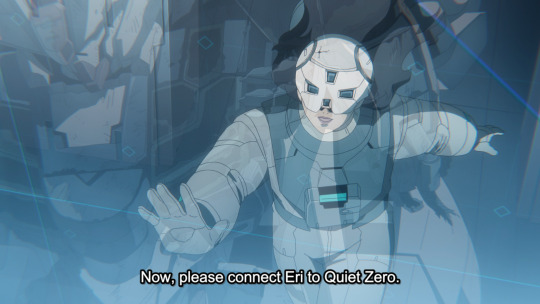
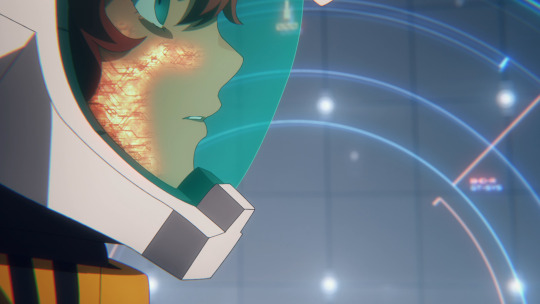

For the first time in her life, Suletta goes against her mother's wishes. Pushing back against her mother, who reveals she'll soon be fully paralyzed and doesn't care about her fate, Suletta rejects the plan that would lose her her mother.


Elan 4's appearance here is a surprising one, especially because there was no reason to believe people could be passively uploaded to the Data Storm until this moment. Even more confusing is that unlike the other "ghosts" seen in this episode, he seems to fully co-exist with the Data Storm like Eri. Suletta finally gets some much needed closure with her first friend, and Elan helps bear the load of the Data Storm so Suletta can connect to Quiet Zero and reactivate Aerial.
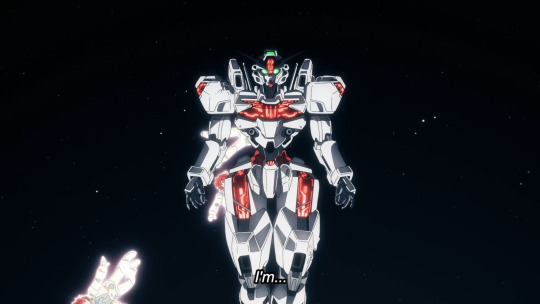
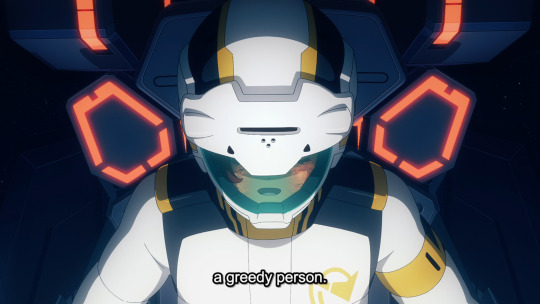

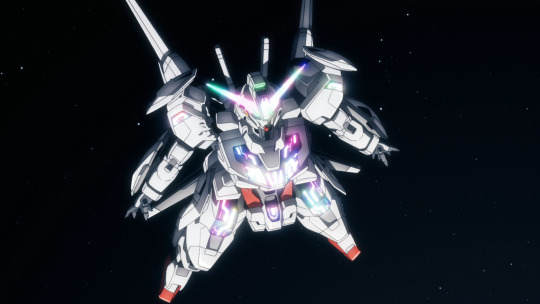
Suletta has always struggled to voice her wants and needs, to express her desires. But here, finally, she calls herself a greedy person, because she doesn't want to accept a future without her mom OR Ericht, and she expresses that desire to Eri. Working together, their hearts aligned, Suletta and Eri surpass Permet Score 8 and create a massive Data Storm that even reaches the moon.
Rainbow Calibarn is my favorite mobile suit ever.
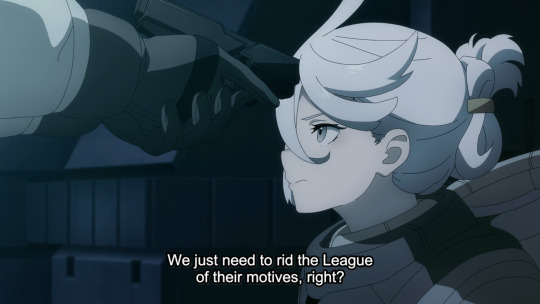
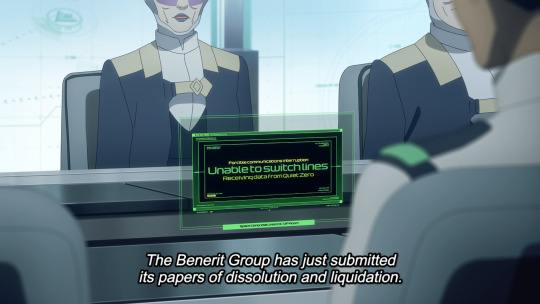

Miorine's is so brave. We finally see the results of the deal she made with Shaddiq in the last episode. She dissolves the Benerit Group and transfers it's assets to Earth, just like Shaddiq had wanted to do. And with Shaddiq's testimony, the world will know that the Space Assembly League had a hand in the various terrorist attacks at Plant Quetta and Asticassia.
Despite that, the SAL still intends to fire the laser cannon, reasoning that they can still justify wiping out millions as long as Quiet Zero still exists.

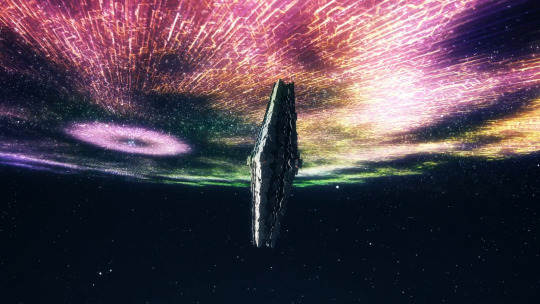
Suletta's crowning moment of awesome, as she uses the Gundam and Quiet Zero to create a massive Data Storm and override the laser and shut it down, all while The Witch From Mercury plays triumphantly in the background. It's the climax of the action in this series, and for a show titled "The Witch From Mercury", it's appropriate that it ends with the titular Witch casting a massive magic spell to save the day while her theme and the theme of the show itself plays. Suletta turns the Gundam's Curse into a Blessing.
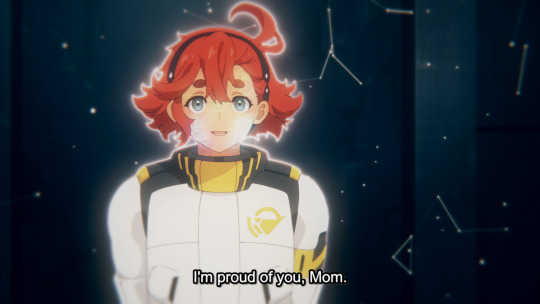
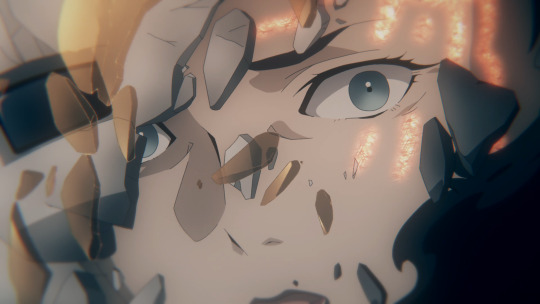

This scene breaks me every time. The culmination of the Samaya/Mercury storyline. Suletta's validation of Prospera's choice to save Ericht, the moment where the mask breaks, Prospera "dies" and Elnora sees her daughter for the first time in 17 years. As both her daughters tell her they're ready to move on and live together, Elnora finally gives up on her crusade and makes a tearful apology to both of them. Wish playing in the background is the cherry on top to this cathartic climax.
My only complaint was the implication that Prospera had long ago completely given up on revenge for Eri's sake. It's true that she set aside her hatred of Delling to work with him on Quiet Zero because she believed it was the only way to give Eri a future that wasn't trapped in a mobile suit, unable to directly communicate with anyone. But that also goes against her portrayal in multiple scenes. She's seen to be revenge minded in Cradle Planet, and one of her most iconic moments in the show is whispering in Miorine's ear that she wants revenge against Delling. And then immediately dragging Miorine through hell for seemingly no reason than as revenge for her father's actions.
It kinda felt like something added to the script at the last second to tone down the "harshness" of her actions while ignoring the fact that she was openly revenge-minded 8 episodes ago.
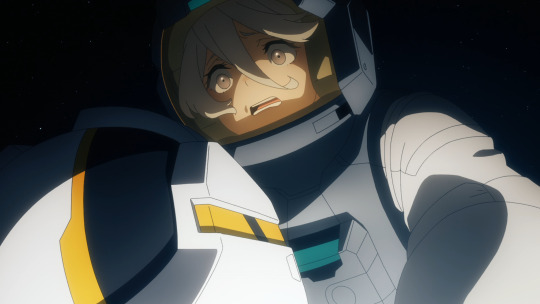
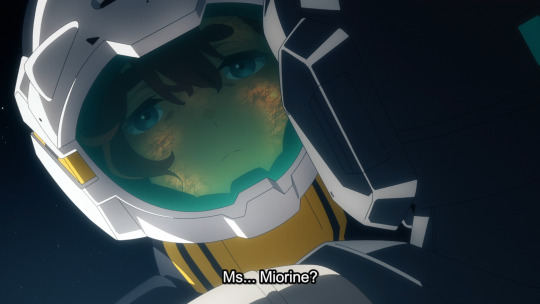

I was firmly in the camp that believed they wouldn't kill Suletta at the end of the show. It just didn't make sense from a narrative standpoint and would've just been a downer ending for the sake of being a downer ending.
But despite that, the first time I saw this scene, they absolutely got me. The deafening silence of Miorine's screams and the absolute horror on her face sold me for a moment that they had killed Suletta, and I just felt my heart absolutely sink. And then Suletta finally responded, and I shared Miorine's relief and joy.
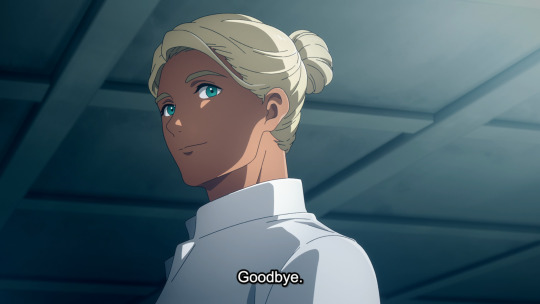
Shaddiq's ending is often a contentious one, especially the fact that he ends up in jail and on trial for his crimes while the former heads of the Benerit Group seemingly escaped justice. But I think a lot of people take too much of a black and white stance on this topic.
Shaddiq is in jail and may even face the death penalty for his actions, something he was fully prepared for, but through Miorine's actions, Shaddiq achieved all his goals. The Benerit Group was dissolved, with Earth gaining the assets that once belonged to their greatest oppressor. His testimony likely did severe damage to the Space Assembly League in the process, exposing the crimes of it's members. And the girls he cared for have their freedom, working for Miorine as part of GUND-ARM Inc, free to make their own impact in the future. And as one final gesture to Miorine, he even takes the blame for Quiet Zero, so Miorine's newfound family won't have investigators trying to jail them. Shaddiq may not be a free man, but I believe he is a satisfied man, no matter what happens next.
As for the leaders of the Benerit Group, yes, they survived and have thus far escaped imprisonment for their various crimes. But their empire is over.
The Benerit Group is no more, the empire Delling built over two decades dissolved by the very daughter he neglected and tried to control. Delling himself doesn't even appear in a scene with Miorine in the epilogue, in stark contrast to the scenes she shared with her new family, and I don't think they're close. She definitely doesn't let him come around her family after all the pain he caused them. And he's under inquiry for this actions that led to Quinharbor and Quiet Zero, a sign that he may still face justice for some of his many crimes.
Likewise, yes the Peil Ladies appear to be in a retirement home and likely had some wealth hidden away so they can have a nice, comfortable retirement. Something 99% of us would be satisfied with, but not people like them. They lost their entire business empire, their plans to come out on top after QZ completely ruined, and even 3 years later they still look miserable that their vast wealth and power is gone.
These people did not come away with a happy ending, they're miserable, even if they're free. For now.

Speaking of miserable, I wonder if Guel is truly happy with this path in life. Guel was an awful person at the start of the show, and through his often horrible experiences, he did grow into a more mature person who wasn't a raging asshole to the people around him, and maybe even learned to trust the people closest to him and not push them away.
But ultimately Guel is the only one not to escape the shadow of his abusive parent, still running his father's company 3 years later. It's unclear, but he's still likely running the company as a weapons manufacturer and possibly still contributing to the problem. I just wonder if he'd ultimately be a happier person if he wasn't trying to live up to his father and instead pursuing his own path like he did when he was "Bob." Regardless, he now has a short-term future of being absolutely sassed to death by Elan and Secelia.

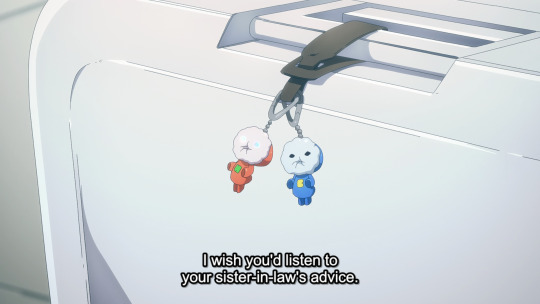
Another slightly contentious topic is Eri's fate. Is being trapped in a keychain really much better than being trapped in an 18m tall killing machine. For a few reasons, Eri is definitely better off now. She's still beyond score eight, something which allows her to reach out and connect to or override any Permet device. Her "body" may be a small keychain, but it comes across to me that Eri's consciousness has been extended and she can see and interact with things beyond her body now, and that when Suletta pushed her beyond score eight, it granted her the freedom that would have been possible under Quiet Zero, but without the massive Data Storm oppression the entire Earth Sphere. And of course, we're shown in this scene that Miorine wears a device on the back of her neck that Eri can connect to and directly communicate with (Suletta is also shown to be wearing one).
Even if she's still "trapped" in an object, she's far more free and mobile than she was as a mobile suit, able to travel and see the world with her family. And her family wears devices to accommodate her unique situation so Eri can communicate with her family. She's no longer trapped in a weapon, unable to communicate with her loved ones. Her existence may not be perfect, but it's undoubtedly better and I think Ericht is happy she's survived this long to once again experience a loving family.
Oh, and "Sister-in-law." It's not as common now, but when the show finished airing and there wasn't an on-screen kiss or wedding, there was a lot of complaining that the show was subtextual bait. And a lot of people overlooked or ignored the fact that Suletta and Miorine being married was explicitly confirmed in the text of the show with this one line. You'd literally have to invent another sibling for Eri that didn't exist 3 years ago for this line to mean anything else, but a lot of people ignored it to argue the show was only subtext because they only see textual romance as specific words and kisses.


Three years have passed, Suletta and Miorine have married and live together on Earth with Ericht and Elnora. A family they fought hard to earn. Suletta was disabled as a result of piloting the Calibarn, with visible Permet scarring on her cheeks. But she's thriving and happy, and clearly loved by her family and friends, ultimate proof that she is loved for who she is and not her abilities. And she's accomplished all the dreams we saw her set for herself during the show: She's built her school on Mercury, married Miorine and saved her mom and sister so they can all live happily together.
It's an severe exaggeration to say that Gundam protagonists always have bad endings, but they're usually more bittersweet. But Suletta fought to earn her happy ending, and to see the first female main character in Gundam earn a happy ending while also being queer, disabled and a person of color is so inspiring to see.
Miorine too, is probably the happiest we ever see in the show. It was rare to see her genuinely let her guard down and smile, something she pretty much only did around Suletta. But she's all smiles when she's with her wife, and after pushing her away once and almost losing her forever at QZ, she just will. not. let. go. of Suletta now, both physically supporting her but also making sure she'll always hold onto the person she loves.

In the first episode, Suletta was hungry, but too shy and nervous to ask for food when she saw Miorine tending to her tomatoes, and Miorine gave her food (and love). Now Suletta has grown and can comfortably express her wants and needs to the people around her, even if it's just the simple act of saying she's hungry. And Miorine responds with the warmest smile possible.
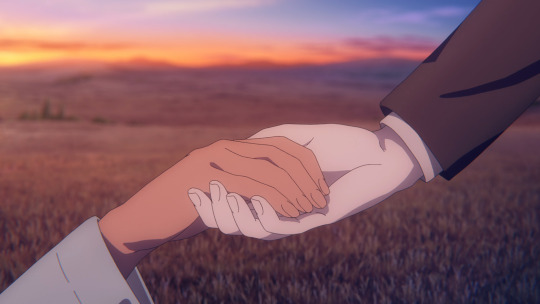
Suletta & Miorine go home together to the house they share. Surrounded by friends and family, sharing a warm meal that symbolizes the love they've nurtured together. They're in love and they're happy, and they leave us with one final wish...
May All Blessings Find Their Way to You, I'm Wishing It

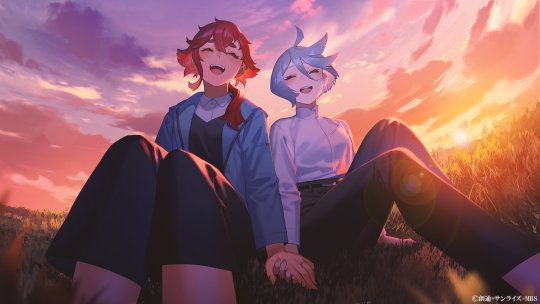
I love The Witch From Mercury and I love SuleMio, and I love sharing my love of this show and these two wonderful characters with others. Is G-Witch perfect? No. But I love it far more than any other piece of media in my life.
Thank you for joining me during these 25 Days of G-Witch. If you celebrate, I hope you have a Merry Christmas, and if not, I hope that you're enjoying the holiday season.
#25 days of g witch#I took 96 screencaps for this episode#g witch#the witch from mercury#sulemio#gundam#g witch spoilers
141 notes
·
View notes
Text
No Place like Home...? 🌈
So what...Ted Lasso just goldfishes his way into forgetting about his big diverse found family so that he can return to humble, hometown heteronormativity? Look, I get that "be a goldfish" is a cute moment from s1 and an idea that has some (limited) practical value. But isn't it also emblematic of Ted's initial overly positive attitude which ultimately just served to ignore difficult emotions, interactions or situations? This is his big advice to his son and his parting words to his audience? Wasn't the whole point of his time in Richmond and his return to his son to establish and encourage an alternative kind of masculinity? One that expresses, not represses? One that deals with difficulty maturely rather than just avoids it? One that actively and ethically chooses rather than simply doing what's always been done?
Honestly? There was plenty of stuff about the finale that I really liked. Colin's kiss was the best bit. That godawful wedding moment the worst, for many reasons. But I'm unsure how to even read Ted's ending, and not in a oh-gosh-it's-so-rich-and-ambiguous way but in a whaaaa....???-this-is-not-consistent-storytelling-this-is-missing-the-mark-for-me kinda way. When Ted looks at the camera, are we supposed to feel happy for him? Happy that he is happy? Is it a happy ending? Is he happy?? He doesn't look happy. Or sad. Or content. Or much of anything really. He just looks kind of vacant. Which is how he looked most of the episode. The final game (which wasn't even the final game and I suppose they justified not showing it for "creative" reasons, okay, sure, whatever) was the only time he looked engaged, and even then it wasn't fully. Most of the time, he did look like a gaping goldfish with a 6-second memory.
When it was time to say goodbye to everyone, there was no sense of nostalgia for the past 3 years and no sense of those relationships continuing. There were no promises or assurances of visits or skypes or calls. Phones, planes and the internet suddenly ceased to exist (when they'd served him and Henry quite well up until then). While the corniest song choice ever played (yes! we get it! the sacred struggle of fatherhood! GAAAHH), one family was sacrificed for another because both couldn't possibly co-exist. Two things at once makes brain hurty. After all the good work they did around dismantling traditional models of masculinity, in the end they reinforced a version of masculinity which centred supposedly noble self-sacrifice rather than ethical self-actualisation, regression over growth and singularity over plurality.
Sure, it bookends the series poignantly, if predictably. And truth is, Ted leaving Henry was baked into the premise of the show from ep 1. It's actually a pretty big emotional leap to take with a character but, as the audience, we made that leap because we understood that this extraordinary move away from his son was necessary for adventure, narrative and growth to occur. In real life, this move would've been highly questionable (esp for a female parent). But we are in a fictional reality here so we are bound as well as freed by the rules of genre, character and narrative. Without Ted leaving Henry, there is no story. We also understand that Ted's adventures will ultimately benefit Henry, who gets a dad who is fully engaged, professionally challenged and supported by a community of like-minded peeps who think he's super cool. By sending Ted back (or at least sending him back in this way), it implies that there is no more story to tell, Ted's story is over, his growth is done. It robs him of further growth and adventure, robs his son of a happy and fulfilled dad and robs the audience of imagining future failures and glories all shared by an indefatigable Richmond FC.
The whole point of this show was to show Ted building a new life, home and family after the disintegration of his marriage. This marriage did not provide the space or opportunity for him to heal childhood wounds or expand as a man. He was a small man, living a small, limited, conventional life. Which would be okay, if he wasn't suffocating in the process. He needed to find a bigger pond. It's possible that Ted's panic attacks were not a sign that Richmond was unhealthy or overwhelming for him. It's possible that there, he could breathe for the first time in years, he had the time and space to feel his feelings, pay attention to his past pain, move up and out and onward. Are we supposed to believe after that 3 years away and maybe 1 of therapy that that's it? He's done now, all healed, squared away? What exactly has changed in Kansas to assure us that he will be any happier there than he was prior? Henry was there then too. Little has changed with Michelle. His mum delivered some food and guilt then left. The show hasn't spent enough time in Kansas to assure us of Ted's happiness or continued growth. Literally, all we know is Henry is there. And BBQ sauce. (And Michelle's boyfriend has turned into a dick suddenly, conveniently).
What we do know well is what Ted is leaving behind. A rich and challenging world, wacky and wonderful experiences with a diverse community, a loved and actively loving chosen family. So are we supposed to read this ending like "The Wizard of Oz" which has the most disingenuous final line in movie history? Yes, Oz has some dangerous territories and menacing figures (represented by Rupert etc). But Oz is also where Dorothy's friends, her found family are. Oz is in bright technicolour. It's surprising and bizarre and bright. It's larger than life and full of weird characters and unexpected episodes. Oz is where we all want to be, to live, to stay. Richmond is Ted's real life Oz. It's where we want to be and want him to stay, even if only in our imaginations. In the finale he says: "There's no place like home but there's no place like Richmond either" (or something similar, only watched it once). This implies that Richmond is not his home, that homes are just where you come from. Homes are not found or created or collaborated on together. They aren't malleable, moveable. They aren't out there in the wild, potential beyond. They are behind us always, defining us by our often sad pasts.
Again, this idea is entirely contrary to the premise of the show and the progress of its characters who banded together under Ted's leadership to create a home, a family, a community. Unlike Ted's small, conventional family unit, his found family is queer-coded (as all found families are, since they suggest an alternative to traditional nuclear family units based on shared biology but not necessarily values). Logical families are the family you find after you have been ejected from the traditional biological family unit. They are sought and created, based on common interests and mutual support. They are made up of people who are likewise separated from their homes, due to distance, circumstance, fracture, whatever. The home world is displaced, but it is still home (and all the more precious for it). In this case, the queer-coded found family of TL includes and celebrates LGBT+ folk (took a while for them to get there but eventually they did), women, people of colour and any man choosing to do masculinity his way. This is the environment the show set up. This the environment the creators invited us into. This is the environment Ted left behind.
Now, I do think there could have been a way for Ted to return to Kansas and Henry (but not Michelle) that would have been consistent with and faithful to this initial set-up and its themes. But that isn't what we got. Like Dorothy waking up to a dingy black and white world where there's nothing to do but talk to your dog about all the adventures you long to have over the rainbow, Ted's Kansas looks grey and dull and muddy. And Ted looks like he only half-remembers the most vivid and important things he's ever seen and done. "Be a goldfish" is a useful idiom for dropping baggage that weighs you down. If you burn your tongue on your coffee but don't wanna be irritated all day, then it works. It doesn't work for a scenario in which you need to deal with the reality that you and your co-parent/ex have carved out very different life paths. Simple, wilful ignorance is not a solution to the sort of complex family circumstances that grown adults face every day. Just forgetting the past 3 years and moving on like nothing ever happened does not in any way guarantee Ted's happiness or his success as a father. Attempting to find fulfillment through that one! special! person!! is unlikely to end well. Whether it's a parent, partner or child, the burden on them is unfair.
Ted's predicament is a huge one but it's also one that has been there from the very beginning. They had 3 years and 30+ episodes to resolve it satisfactorily, using all of the freedoms that fictional realities can afford. And yet, when Rebecca brings up the various ways in which she is willing to adjust to Ted's fatherhood, these suggestions are made to sound ridiculous, impossible and totally futile. But are they? Are they anymore outlandish than any of the other highly optimistic plot points they've gleefully included? Ted flourishes personally and professionally in this milieu. And had they made a move earlier in the series, Henry could also have integrated into it and benefited greatly from it. (He clearly enjoys the club when he's there). As Rebecca implies, Ted has the opportunity to offer Henry a richer, wider and more diverse view of the world than he would otherwise have. He would have access to a queer-coded community that includes and celebrates, experiments and strives. He would see his dad loved, celebrated and supported. This show takes some BIG optimistic swings. If audiences were able to make the emotional leap of accepting Ted leaving his son in ep 1, then they can probably be trusted to make the leap of him staying, esp. if the writers took the time each season to establish how they will manage their relationship and the benefits each will glean from such an arrangement.
After all, Ted is not one to back down from a challenge. Taking the job at Richmond was a bold and brave move. This is the same man who pledged to "win the whole fucking thing". This is the same man who looked Rupert Manion in the eye then promptly whipped him at darts. But when it comes to distance co-parenting, he's not even open to suggestions? No "I appreciate you" for the boss/bestie, just oh-so-sage resignation? Please. These writers set up this predicament then refused to resolve it in a satisfactory way. Instead, they reduced Richmond FC to a dream and Ted to a memory-challenged goldfish who flails about when faced with the reality of a pre-existing predicament of his own creation. He rejects the help of others who could actually provide real-world solutions. Nor does he seem to register the possibility of a mature relationship with a woman who wants him and connects with him. Instead, he chooses to forget, keep swimming, paddle backwards -- not onward, not forward. He has a big pool, a new home, a found family that represents human complexity and plurality. But he chooses the small, simple and singular. A traditional three-part family unit that was supposed to make him happy but never did. He had his little holiday jaunt in technicolour land, a fun lil detour into an expansive rainbow family community. He came in, tinkered about with some people's problems: gave a middle-aged woman confidence here, supported a sad gay there. But rainbow families are not just a temporary playground for white cishet dudes with a saviour complex to get their own admirable values reflected back to them. In the end, Ted's found family had something absolutely vital to teach him that he did not stick around long enough to learn.
#ted lasso#ted lasso finale#ted lasso tv#ted lasso season 3#spoilers#jason sudeikis#brendan hunt et al#ted should have stayed#ted x rebecca#btw this is airing during pride week/month while some parents are trying to keep their kids from learning about the big bright queer world
152 notes
·
View notes
Note
can u explain the concept of the death of the author? i understand there is always more than angle to approach and interpret things from anyways and people dont have to agree fully. but like how does this make sense in fandoms? so far in my experience in mxtx fandoms i feel like it is used dismissively to justify a person’s headcanons or misinterpretations or misrepresentations of the text or characters or romance. obv the author doesn’t control the text once it is published but ti imply like you know better about their characters or text when they write tight narratives like mxtx seems kinda weird to me lol
Hello there anon.
Well, from what I can preface what this means is simply: a literary theory that argues that the meaning of a text is not determined by the author's intention, but rather by the reader's interpretation.
Authorial intent and theme establishment is irrelevant here, in theory it relies on what the reader feels it means and is reader-centric in practice. The text of the work is not the point, it is what it makes me, the reader, feel about the execution of plot device and what I think it is about from a personal perception and what my final interpretation of it is as a whole regardless of textual passage thematics and authorial intent for why this is written the way it had been.
Now, I'm not a fan of this literary theory. It's pretty much my most disliked literary analysis approach since there is little point in trying to argue that one personal reaction is relevant next to the other come time for example and author intention that can and will dismiss what I may have unintentionally assumed, and still choose to despite it having no concrete basis from the text itself.
This has been twisted in fandom space, especially within the past 20 years now to mean, I do not like this or care about author end goal and will use death of the author to claim textual validity (or hey no textual basis because impulse first) that is not or has no merit other than my personal want and feelings.
I can argue for something nebulous as thinking Madam Yu did care about Wei Wuxian, because I may want to see her reactions as parental due to personal experiences, but we are not given this within the work nor is it ever implied. But I can choose to say death of the author here, because my personal interpretation/experience tells me it is so. This also veers into ship discourse, the author straight out will say no other men in book are romantically involved and do not feel romantic inclination, but, I think there is chemistry and sexual tensions within their interactions, therefore my interpretation trumps that of author intent due to my assumption.
My personal interpretation is above that of author meaning of thematics they wanted to explore. My unintended themes I see are most important. I see something here that the author didn't want or need to explore for the work, therefore I can sit in a nebulous space that works for fandom exploration. This gets tricky when the fandom interpretation starts to run counter productive to the work itself, as with the likes of Jiang Cheng. He is not meant to be a good role model or a positive position by author intent, but fandom can begin to carve him into something that is not intentional and death of the author begins. The death of the author interpretations become popular while running counter point to the original intention and it begins to be argued from the start the death of the author theory was meant all along despite the contrary.
#mdzs#mo dao zu shi#oh fandom#fandom is not canon#feels before facts#does not make it more valid unfortunately
21 notes
·
View notes
Note
There is a former (I guess?) blog that seems more upset about the recent bangtan bomb than some jkkrs. So they are really committed to saying that JK was annoyed and "dead eyed" at Tae. I think objectivity and even criticism can be healthy for a fandom. But this just seems like a really awkward way to try and justify their own cynicism about TK. Their whole vibe is weird. They say they don't believe but they talk and theorize about TK just as much as a TK blog. Except its under the guise of being some "voice of reason". So they seem to be particularly pissy when something comes along to disprove their whole angle.
Hi anon!
Well I really don't know where they get the 'dead eyed and annoyed' from. that is not my interpretation of that footage at all.
I think it's a good thing when people dare to go against fandom narratives. I mean, there is a lot of nonsense going around, so skepticism, objectivity and criticism are good things. What I have personally found tough at times is when people try to push me into going alog with a certain narrative (like seriously, the shit I got for saying I think the Paris walk was really them was kinda weird). People having different opinions is a good thing, and none of us actually know what the entire truth is. It gets a bit problematic when people start being nasty and degrading to people with different opinions though. Calling onesself a "voice of reason" is a bit... meh to me. Who is to decide what reason is in this case anyway? To some the idea of two persons of the same sex being together is unreasonable for instance.
There have been several narratives going around for quite a while... one of them being the "Jk is dismissive of Tae" one. There's a lot of accounts that really went for that one. To me it looks as though they have at one point decided that that was going to be their angle, and they now just always see Tae and Jk's interactions in that light. Why? No clue. Everyone interprets situations with their own set of experiences in mind. So who knows what that specific account's experience (with fandom, or in private) had been to come with this narrative. I know Taennie hit some people hard, I know the Jk vids hit some hard, we all just try and make sense of things in our own way.
Whatever you think of their relationship though, I absolutely disagree with the "Jk is dismissive of Tae" narrative. The love he has for Tae is absolutely there and I think many take Jk's "holding back" as something he does because he doesn't care for Tae as much, when I think it's more likely he's holding back at times because he cares so much.
11 notes
·
View notes
Text
To be fair, ST does do stuff with Shadow that I don't always agree with.
One issue that I've always somewhat frowned on and find hard to reconcile even to this day is giving Shadow a gun. ST only gave him a gun because the kids at the time were all into "Call of Duty: Shoot a Man," and instead of giving Sonic one like they wanted, ST decided it would be more germane to give Shadow one. And then people kinda made ad hoc explanations to justify it after the fact, despite the fact that Shadow went through three previous games just fine without them.
I tend to compartmentalize my feelings into two categories: Shadow using guns from a narrative/character perspective and Shadow using guns as a gameplay mechanic. I don't really have a problem with the latter as much as the former.
It's clear ST designed ShTH around the assumption that you'll make use of the weaponry. And it's not just that the weapons themselves are meme-y fun, though that is a factor; the game is too much of a slog without them. They're a core part of the game's design and are meant to be used. Unlike SA2 which emphasizes speed over combat and hence why you shred through enemies like tissue paper, ShTH's enemies need at least two hits to die.
However, from a character standpoint... I get kinda "ehhhh :L" about it, even now, 22 years later.
And I don't even necessarily mean to frame my aversion in a way that turns Shadow into Batman, as though he'd swear off guns because muh guns killed muh Maria or something like that. It's more along the lines of questioning the premise of the argument: "Well, does Shadow always do what's most pragmatic in combat?" Because... this is the same game where you can flip a bus to squash some grubs in Westopolis. Pragmatism, though a general driving rule, is not always and forever Shadow's MO in an iron-clad sense.
In addition, I tend to question whether a gun is the most pragmatic option in certain situations. SA1 showed us quite clearly that bullets do not always guarantee a monster's defeat. So what's the more pragmatic option there? Beating it to death with your fists? Then that kind of defeats the purpose of picking up the gun to begin with, eh?
Besides, I don't think I can fully buy the "Shadow uses a gun because it's the most pragmatic option" explanation anyway because it almost risks veering into "portraying Shadow as The Terminator" territory for me.
While he is willing to make use of the resources around him, at the same time, it's not like he's a robot running protocols to execute the most efficient way of killing someone. He killed Eggman with a karate chop in certain endings, and that was where he was confirmed to be an android and thus in a situation where a more pragmatic execution would have been justifiable.
12 notes
·
View notes
Note
Can you do Nya for the doodle/ramble? :o
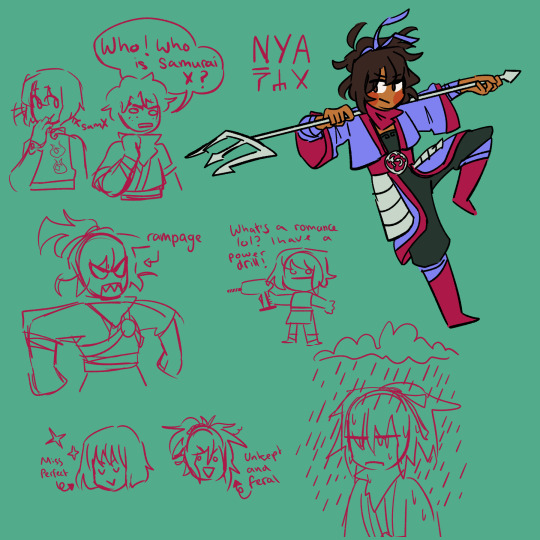

Nya!!
DISCLAIMER: sorry sorry sorry this is so dang late, I have been sitting on this essay for like 2 months and I feel really bad about it. I just had so many passionate thoughts about Nya until school and work and assignments meant I lost flow and I probably won’t finish it. Tbf I did write lots so Oop lol. I’m just gonna post it unfinished like this so take away what you will :)
Awww hell yeah! So in the last post of this series, I said that Cole is probably the best written character, but i think Nya is the most interesting, and Cole’s only higher because sometimes Nya falls into kinda sexist cliches sometimes. But for the most point Nya is such an inspiring character who goes through so much strife. Honestly I think that her writing is actually a really good commentary on modern day misogyny, which is unexpected since this is just a Lego show marketed to mainly boys, and even if it wasn’t, Nya’s arc hits so much harder than you’d expect. But either way, regardless of the societal analysis, Nya is generally a really strong character who gets a lot of development simply bc was more of a side character who basically fought her way into the plot.
So the main themes of Nya is her struggle with destiny, whether she has free will or choices or if she just has to do what other expect her to. Like so many of her arcs are her struggling against what other people have told her to be or what she tells her self she has to be.
First of all, her time as samurai x and how she initially kept it a secret. In s1, in like, the first episode, we see Nya training on the training course trying to beat Kai’s score, wishing she had a dragon, and generally trying to tag along with the guys despite not being included in their team. Maybe you could argue she always wanted to be a ninja, to prove that she could do that too. However it never really caught on (until much later), and she ended up abandoning that idea in favour of becoming something else; samurai x.
I’ve always thought it was weird that she kept samurai x a secret when there wasn’t really any consequence to it when everyone found out. I think that maybe she felt a little bitter about not being included with the ninja so she decided not to share in what she got up to. Also I bet she just kept it up because the guys’ annoyance at not knowing who she was, would’ve been actually hilarious. But also she may have kept it a secret because no one could tell her how to be if no one knew it was her. Samurai X was her way of having freedom and independency, and her way of proving that she was useful, most importantly, in her own way on her own. She wanted the power to make her own choice and in order to do so, she didn’t even risk letting other people in the know in case they took it from her.
Short mention of s2 but the scene where we see Nya get corrupted is actually so horrific and invasive but it completely fits Nya’s narrative of getting her choices taken away as she’s corrupted by the dark matter. Ooh, quick s2 rewrite concept but the dark matter doesn’t immediately make you evil, but it only builds upon already dark feelings present, and in Nya’s case its her struggle with being alone, presently the fact that she was captured and overall how she gets singled out for not being a ninja or how she has to work harder to be seen alongside everyone else. With both her and Kai, they both seem to equate their worth and right to be in the family with how much they can contribute, and Nya especially puts a lot of pressure on herself, to be just as good or even better than the other ninja.
Now s3. S3… is a mixed bag. Bc it’s notorious for having a god awful love triangle that arose out of nothing but then if you think hard about it, everything after the set up kinda makes sense. Jay and Nya have kinda a strained relationship, where if we view s1 and s2 skeptically, their feelings aren’t really justified further than “jay likes girls and Nya is girl” and “Nya happens to like the colour blue”. It feels very forced hetero 2011 writing because it kinda was, but at least s3 is consistent. If you’re generous and are invested in making the most of a Lego show’s writing, then you’ll be happy to know that all of that accidentally works really well. Because we can assume that jay and Nya were quite young and it’s very common for kids/teens to just get into relationships in only name, for the pure reasoning of “we are guy and girl who hang out sometimes” Nya and jay being in a loveless, one sided relationship where neither are on the same page is pretty realistic actually, and the show tells us that Nya isn’t as invested as jay is and how there seems to be a fundamental imbalance of affection between them. Whilst I hate that Nya changes her whole mind as soon as the computer tells her to, it kinda works in that its consistent with Nya’s incredibly surface level reasoning for attraction. Her mind set is basically: if she was told a guy liked her, then she’s supposed to like them back right? That’s just what you do! Compulsive romance is so real and it’s how I personally see Nya in s3. Also it links in either s3’s theme of relying too much on technology, with Nya being swayed because of it.
Now the actual love triangle links back in with Nya and choice. She’s forced to pick between Jay and Cole but even if she does pick one, she’ll let the other down, or they might not accept it. It looks like she has a choice but there are no good options. And when she feels like she’s fighting against the grain, just like when she gave up from being a ninja, she too retreats from the conflict, avoiding giving an answer that she knows wouldn’t be accepted. She just lets them duke it out until they’ve forgotten about her and any relationship she had or could’ve wanted. By not picking a side, both sides left her after s3 and she just accepts it.
…or maybe I’m looking into to it too much as a way of coping with awful love triangles.
Quick note about s4, bc Nya kinda just kicks ass that season and I honestly don’t have too much to say. She’s just very cool. I will say that’s it’s interesting that she stayed home with wu Lloyd etc when the rest of the team dispersed. You could say she again was left behind. She stayed rebuilding the bounty, which may have been in tribute to zane considering he found the bounty. You could say zane brought the family together and found them a home, so when he died, Nya tried to fix it by remaking their home. Im gonna make a separate post about this actually.
Okay s5 is where we really get going and tbh, this season should’ve been more officially Nya. Because she’s actually becoming a ninja. I think with Nya interpretations, people usually see Nya being a ninja as a bad thing, something that was again forced upon her, which is true. I’ll talk about this again when we get to crystalized. But idk if this is a hot take but I think ninja Nya is a good thing, if you interpret samurai x as being a last resort because she didn’t become a ninja. It’s her learning to not give up, to keep at it, which is how she unlocks her true potential. That she’s just as valuable, in fact, uniquely valuable on the team. Idk I think it’s nice if you look at samurai x being her giving up on trying to be a part of the ninja. Her arc of needing to be perfect at what she does, without allowing herself to be messy or vulnerable or confront what makes her weak because she always thought that if she was a ninja, she’d be the weak link, and confronting why she hadn’t become a ninja makes her vulnerable. And her facing that fear and realising she’s more than she gives herself credit for is so so so good. Nya actually has such a low self esteem and tbh you can’t blame her when it looks like she has to fight tooth and claw to be as good as everyone else, but I’d bet on her being the strongest ninja, in some ways stronger than the green ninja. It’s very fitting that she wears the green gi in s5’s finale, because when the ghosts realise she isn’t the green ninja, they’re actually more terrified. Because she is something more feared than the green ninja. The water ninja. One of the only elements that the fsm couldn’t control. She single handedly drowned the preeminent (and destroyed an 1/8 of the universe but shhh).
And then we get to s6, which is only really good because Nya. Because even when she figures out she’s super op, society hasn’t. We get the whole news stuff in the first episode where the ninja deal with their acquired fame (nice acknowledgment of the rest of the world tbh), and we’re highlighted of how, whilst Nya took down a literal eldritch monster in the last season, she’s still only known for the love triangle, and it feels a little meta because I bet that’s what a lot of fans knew her for too (and I say this because unfortunately 13 ye old me was that, but I’ve rewatched since). We see Nya having to face everyone else’s expectations of her and the media doesn’t see her as anything but the girl ninja and she’s just told to accept that. And even when she’s trying to go against the grain, the fact that she’s only doing it to prove or disprove someone else still means she’s technically still controlled by something else. This is how I interpret the (admittedly mess of) the romance plot. Nya has and does love Jay, but she’s scared of that being all there is to her, that doing what the media expects her to means giving in to it, and losing her sense of independence. She basically can’t do what she wants because she’s holding herself to standard in response to other standards placed on her. It’s like a form of toxic masculinity but for feminism, where women feel like they have to be tough and never vulnerable because they’re trying to fight against being defined by those traits of vulnerability. Nya and Dogshank in particular, have a very specific relationship, they’re on opposite sides but play exactly the same roles, women who fought against the grain and did what was not traditionally expected of them, but in they’re fight to do so they ended up sacrificing their own freedoms anyways (Nya stops herself from getting close to the others in her need to be independent, Dogshank traded her life to be Nadakhan’s pirate just so she could win at something once). And say what you will about s6 but Nya’s death scene will always be the saddest thing, because we truly see Nya just give up her life. She’s so resigned to her fate, finally giving up on changing it and tells Jay that she never wanted to be apart of their boys club anyways. The reference of the “boys’ club” comes up 3 other times in the show: when Nya reasons why she became samurai x - she felt excluded in the group, when Nya is corrupted with dark matter and the guys fight her - Kai quipping that the “club” just became boys only and when the love matcher machine in s3 describes Nya as an independent self confident young woman who refuses to be part of a boy’s club. The evolution of the use of the quote, going from the reason Nya felt excluded, to Nya being defined by it and lastly as an acceptance of her own death, sums up what I mean, Nya internalising that “othering” and just growing to accept it. Nya then says that she guesses it’s true, the greatest love stories end in tragedy, which I think shows how she’s been told and sold so many expectations of how she wouldn’t end up happy, and it further shows how she’s given up. And the resolution of the plot isn’t perfect but I actually do like how Jay essentially bent time and space to show her that it doesn’t have to be true. Metaphorically, Jay erasing the timeline feels like he’s erasing the proposed bad end Nya’s predicted of herself. S6 is definitely flawed but I do like the theme of inevitability and the defiance of that with Nya in particular.
~~~
Yeah sorry friends that’s where I stopped. But I’ll paste my little planning stage so you guys know what I would’ve started writing about?? Anyways Nya good!!
Intro- hell yeahhh - good writing altjough ppl don’t think so
- boys club - choices
- Samurai x inventing her own identity but in retaliation
- Water ninja - child of destiny
- S6 choosing her own fate - crystalise
- S11 powers significant + seabound
- Crystalised
- Tidbits such a cool narrative but like s567 could’ve been even cooler
Conc honestly I get emotional bc she’s actually so cool man
#and very sorry to all the other doodlarambla asks I have I still wanna do them#ninjago#lego ninjago#art#Ninjago nya#fanart#digital art#doodlarambla#Ninjago doodlarambla#ask#hhhhhhhhhhhh#ninjago analysis
114 notes
·
View notes
Text
[Magi reread] Night 74: Something Sublime
Bro, my heart is not ready. But let's go.
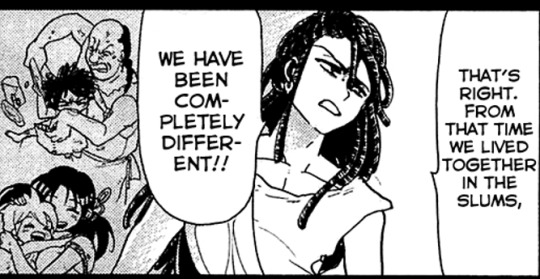
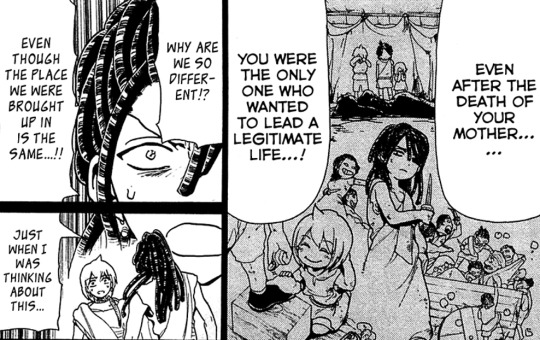
1 - I was like "man, Cassim's just living his worst life ever, and then my brain was like, yeah, that's kinda the point..."
2 - Once again, Cassim contributed to Alibaba living that kind of life. And "you [...] wanted to lead a legitimate life" is bullshit. Alibaba had offered to help Cassim & his troupe, it was Cassim who told him not to. And Alibaba listened. But it's not like Alibaba's been actually all that concerned about staying pure and shit.
It's a huge theme for Alibaba, tbh, just people assuming things about him. I'm especially thinking aboout Cassim and Hakuryuu, but you could probably add Sinbad if you really wanted. They have this idea of Alibaba, who is a pure and naive child, and they look down on him, and in hindsight, it makes sense that there's envy involved. Why were they treated differently by fate? Why was it Alibaba who was allowed to remain innocent? This happy-go-lucky idiot? They really delude themselves into believing all that stuff, too lost in their self-hatred and despair to actually confront the reality of them being just plainly fucking wrong about it.
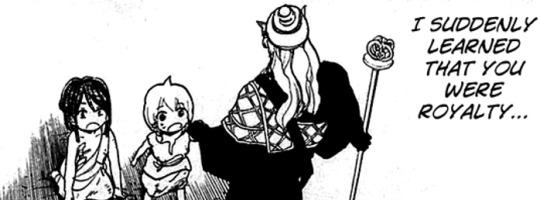
A small reminder that this is something that happens not that long after Cassim had killed his father, and, yeah, I know I kinda criticize the guy a lot, but I can't fully blame him. At least for the feelings. Like, yeah, no shit he needed Alibaba to stay that pure child, a beam of light, Alibaba and Mariam, really. If they were gone, if the world destroyed that light, then what was the point of that world in the first place? It was just awful, end of story. Why keep living in it?
Whether either of them had realized that, Alibaba was giving Cassim hope, especially after Anise and Mariam had died. Hope that there were still good things in this world.
But just as he needed Alibaba to remian that innocent child, he also needed Alibaba to fall. He needed him to fall, because he fell, and if Alibaba went through the same hell as he did but didn't turn out like him, then that means... Cassim could've, too. It meant Cassim was right to hate himself, that there was always something wrong with him.
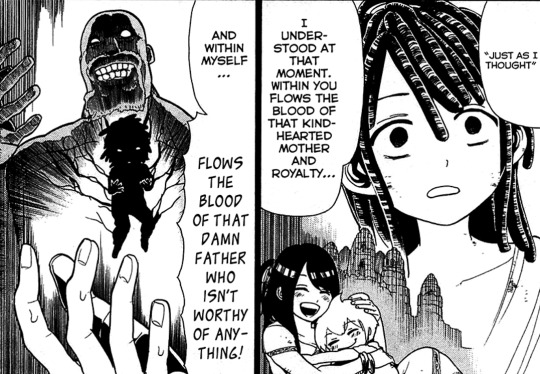
And he created that narrative in his head to justify giving up on himself. It was easier, after all, than to keep trying over and over again.
But you know who kept trying? Alibaba. Cassim thinks the slums (or any other tragedies in his life) didn't influence him in any way, but that's wrong. Alibaba is extremely insecure & he hates himself, too, but not to the point of giving up completely.
But at the same time, Cassim isn't completely wrong. Fate set him up for failure by giving him that scum of a father, who abused him until he disappeared, while Alibaba had a loving mother who kept him safe. Cassim was severly traumatized, and it was something that never healed. He was a fucking child.
Like, bro, I have so many thoughts about it all, I just struggle to convey it right now. It's such a mess that cannot be perceived as good-vs-evil dilema, bc it's not. It's too complicated for that. You can see where everybody's coming from, and even though you can't condone Cassim's actions,you can at least understand why it happened. What led him to that place. And you can't fucking blame Alibaba for not doing more, because he was a goddamn child, too.
Two victims of circumstances, too young for any of this and living in a world that just didn't care about them. It was always going to end in tragedy.
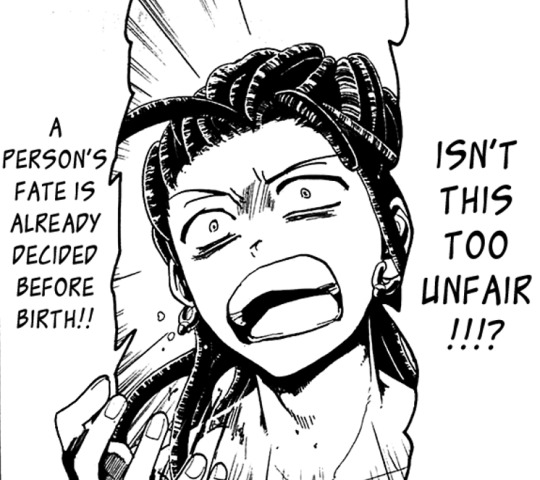
It is unfair. It's extremely, extremely unfair.
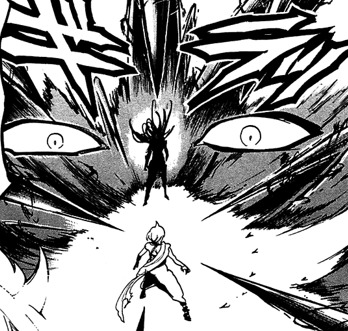
Fucking sick. Cassim's feelings are just that overhelming.
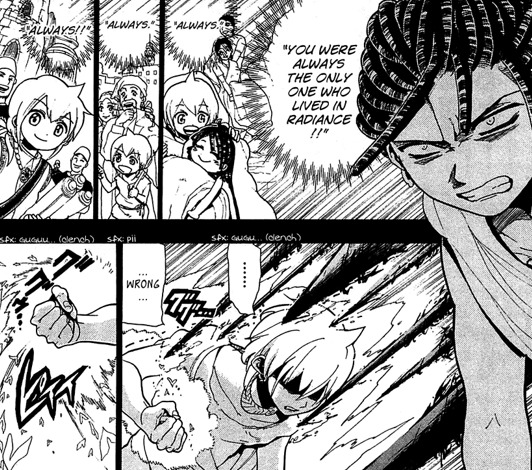
I've already said it. But Cassim's perspective on things is just like that.
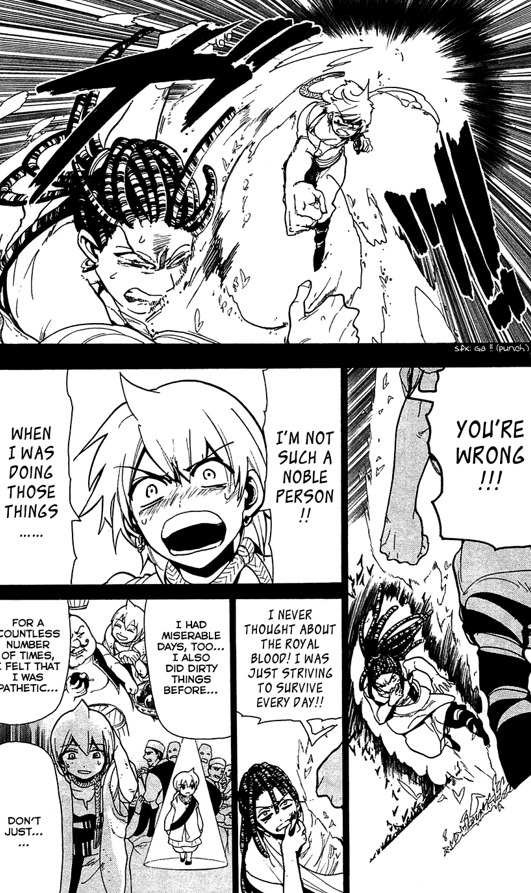
And by GOD it's fucking cathartic to se Alibaba fight back. Because
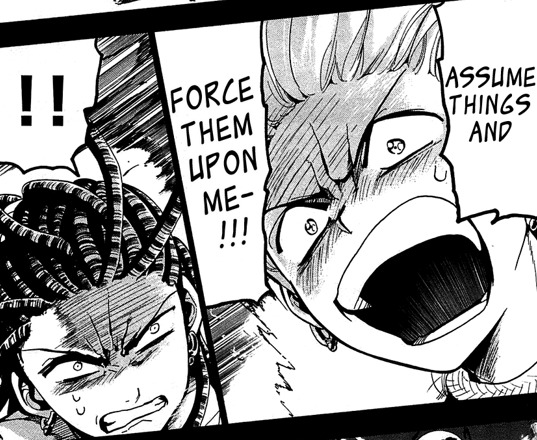
That's exactly what it is. Cassim just assuming things about Alibaba, and then getting mad about it. It'd be different if he was actually mad at Alibaba, but he isn't. He's mad at his image of him, and Alibaba has every right to be furious. Especially right now, after hearing all that cruel shit, and after all the other things Cassim had done to him. To realize that all of this happened not becaues there was something wrong with him, but because Cassim had put him on some weird pedestal he also wanted to throw him off of. Like, bro.
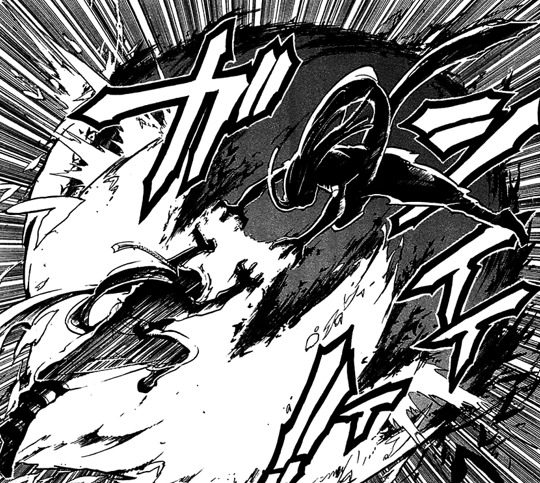
This looks kind of funny, ngl.
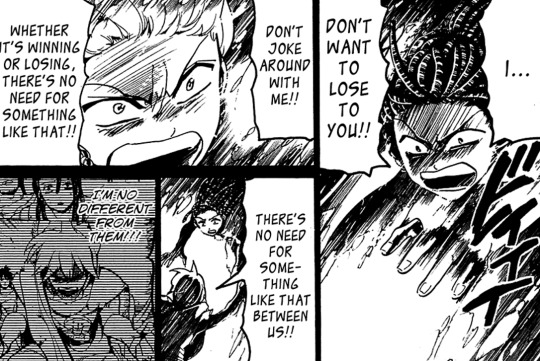
I can't fucking believe I'm already starting to tear up. Idk man, just look at Cassim's face when Alibaba says there's no need for that between them. It's like his anger is evaporating.
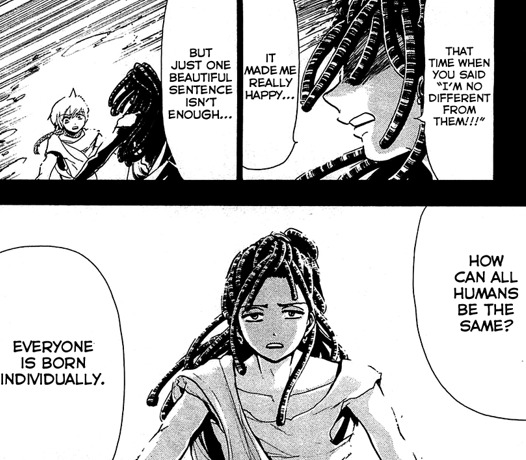
And all it does is leave soul-deep exhaustion.
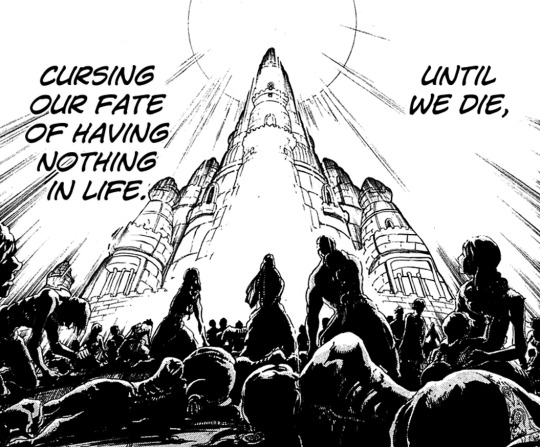
This fucking imagery. God.
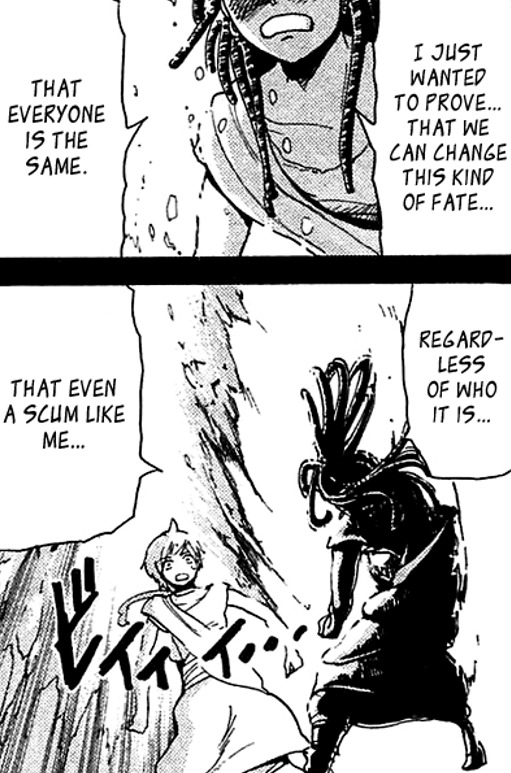
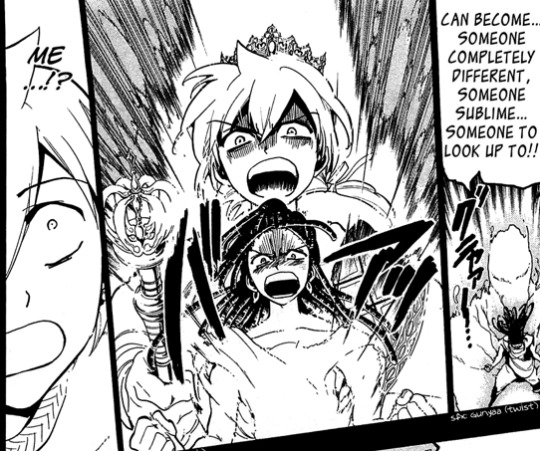
Bro
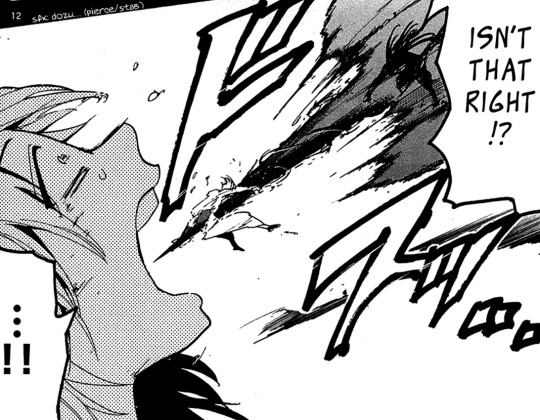
I was busy being sad, but my brain decided to point out that it looks like Alibaba is eating himself. I just can't.
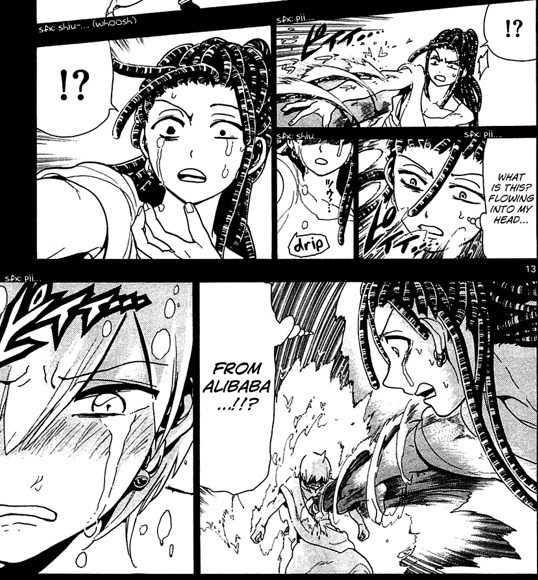
So, uh, fun fact, since I worked out my issues with dissociation, it turns out I tear up pretty damn easily.
Anyway, I'm fucking just
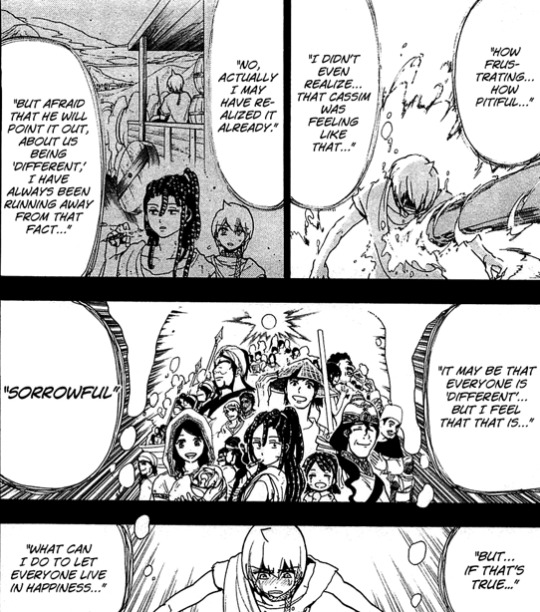
Bro, I can't do this man. And also, Alibaba isn't stupid, he's actually pretty damn perceptive, but he just doesn't always... do much about it. Admitting it and confronting... It's horrifying. After all if he admits it, he risks their already shaky friendship, he also risks outing himself as "too different". He never belongs anywhere, too royal for the slums, and too much of a slum kid for the royalty. No place accepts him fully, and he knows it, at least on some level, so he clings to what he can even if it means running away from the issue. Becaues he can't risk it. He hates being alone.
I know I've made this point several times, but tbh, it's such a intrinsic part of who Alibaba is that it just keeps on being relevant.
Back to depression k
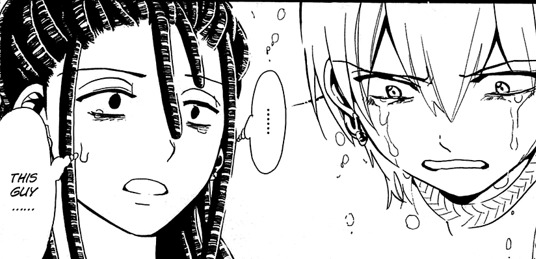
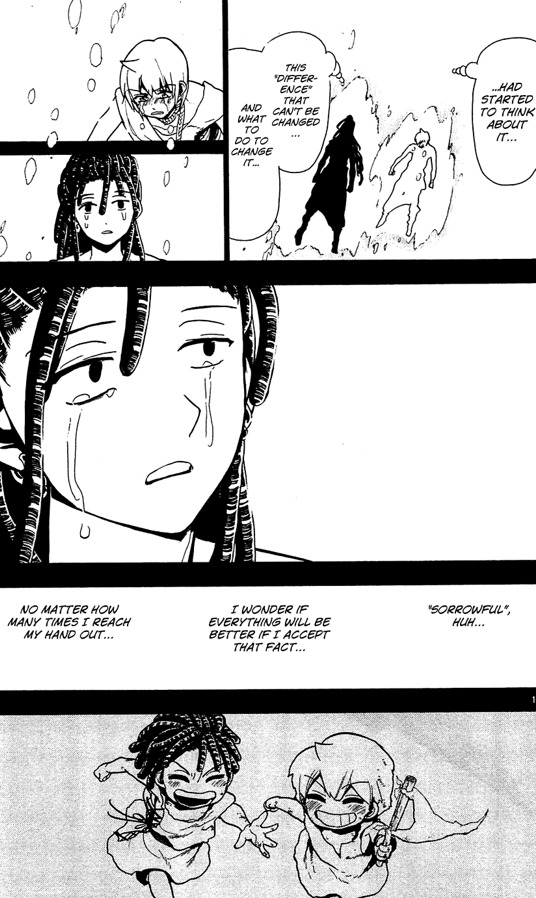
Bro. You can't fucking do this to me. Sorrowful as shit.
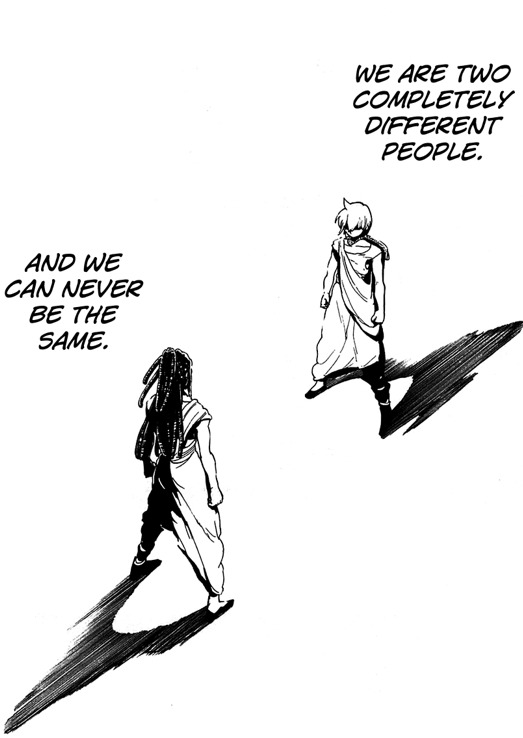
Yeah. And, like, there's nothing wrong with being different. That's just how it is.
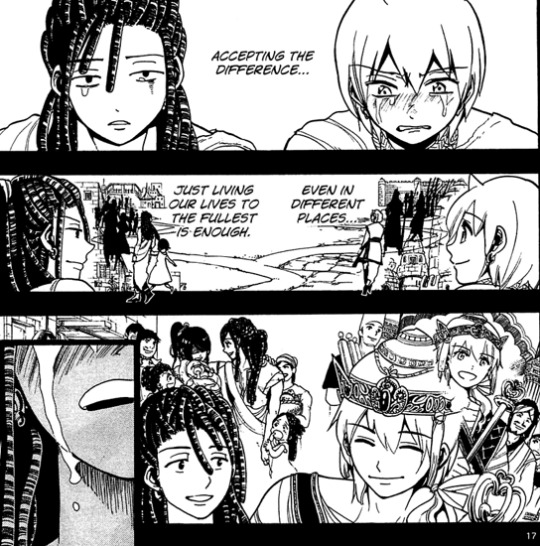
This what could've been always gets me, but I'll give the anime props when it's deserved, bc I feel like it hits harder.
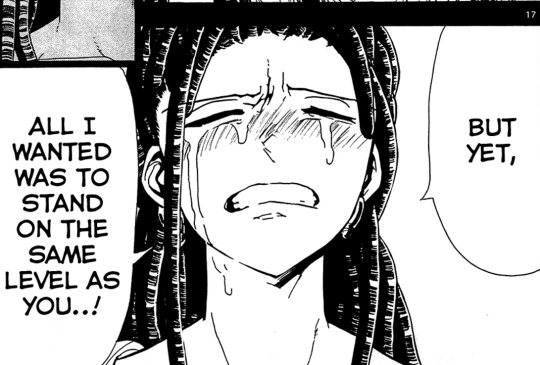
Idk man, I just. I always end up crying for this dumb bitch
4 notes
·
View notes
Note
I like nightheart and yes it relies on the fact that I used to be like him. Keyword, used to. As a teenager I was just as whiny, had those same outbursts and that same skewed world view of “I’m always the victim no matter what so I can’t possibly hurt someone in a way that isn’t righteous or empowering”. I hate the narrative structure for how they represent him but I like the character. I feel like in an interesting way he could’ve been a rebellious little punk stuck in his own little world where everyone is against him for existing when this idea that he’s the real victim goes too far an he hurts some one for real. In a way that isn’t justified or righteous in a very obvious way and that sorta pops the bubble - for the first time in his life he’s faced with the reality that he can be exactly what he hates about others and that he’s been like that for a greater part of his life. He has potential to be a redeemed protagonist and a lovable bastard but the story bends over backwards to make him right all the time in the fact that everyone hates him for no reason. Finch especially - their weird “betrayal” makes no sense.
Also - though unintentional (because the erins would never) the accidental trans subtext is there and being that same asshole as a teenager who was also trans kinda made me love hate him more. He’s such a fucking dumbass, he has no clue that he’s so completely and utterly wrong about everything and you just wanna shake him violently. I like him but in the same way I like a lot of other characters in this series - conceptually intriguing, a failure in action.
Which speaks volumes on the quality of these books alone.
11 notes
·
View notes
Text
I’ve been trying to think of how to word a second impressions of TOTK, now that I’m focusing almost exclusively on main quests and honestly... it’s kinda boring.
I mean, it’s boring in the way I feel about most modern LOZ games, in which the more the narrative tries and presents itself as grandiose and epic ironically the thinner I find the whole façade. Main quest events can be fun to do in terms of gameplay but the story just does a bunch of little things that add up and will always bug me. I’ve seen other people really enjoy the main campaign, and honestly good for them, wish that were me. I wouldn’t be surprised if on a second playthrough or so I just plain skipped most of this and focused on side content that I enjoy more.
Ganon may as well be a voiceless boar monster again for all his character has actually contributed. I know he’s had dialogue, but aside from the first scene, I genuinely can’t remember what he’s said because there’s no real personality in it and it just doesn’t matter. Unless a twist happens near the end that really adds something, this confirms my thoughts that Ganon might be the most boring recurring character in video games.
I do still care about Zelda, though. She’s a slightly different character (can’t have her nerd out over ancient tech if we’re acting like that stuff never existed now - the retcons in this game fluctuate between acceptable and hilariously bad) but I still like this version of Zelda in her own way. She comes across as a determined young woman with a small arc of learning how to best help and protect those she cares about. It’s not an especially unique storyline or greatly told, but its endearing enough for me to have hunted down every version of “memories” to see a bit more. This game still carries over from BOTW a sense that she is a deuteragonist, she and Link have storylines that work in tandem to each other and that’s interesting. Know that I am continuing the main story for her and her alone!
TL;DR this game has some cool ideas but they’re diluted over a story that just doesn’t have enough going on to justify its own sense of importance and the work the player has to find most of it.
0 notes
Text
April 2: You S4
I have accomplished nothing this weekend except writing my Troped fic (draft), finishing You Season 4, and, just now, washing some dishes. I mean that's a pretty good amount of writing, which I am proud of, but I am soooo far behind on everything else. And this week is just going to be so un-fun.
I enjoyed Season 4 on the whole, but only because it really picked up in the last 4 episodes. The first half was a real drag. I only watched it as fast as I did to get to some answers but I was not exactly riveted.
Looking at the season as a whole, I'm very torn. On the one hand, I get what they were trying to do, and I think the season did effectively set up S5 as a finale/wrapping-things-up season. Positioning Joe as not only the successor of Tom Lockwood (the worst man on Earth, canonically) but as everything he himself, and the show, has hated from the beginning--rich and vapid and above normal-people consequences--puts him in a good position to be taken down definitively in a way that doesn't seem arbitrary. That's always been one of the big problems for ending the show, imo: his character is so defined by his slipperiness, his ability to get out of any situation scott-free, that finding an ending that seems both truly believable as an ending (is there anything other than death that he couldn't weasel out of?) and placed at the true conclusion of his story, where there is nothing else he could do but be killed or otherwise disabled permanently from causing future harm, has always been tricky. And it gets trickier with every season. It's smart to put Joe in the position of the type of person who does tend to die: people of privilege. Also, stripping him of one of his more, for lack of a better word, relatable qualities--his snarky, sarcastic impatience with the vapidity of the elite--will make it easier to see him go. Because, no, I'm not a Joe apologist, but on the level of character he is fun to watch. That's kinda the point.
I know it's early to say things so definitely about S5, and certainly I could be wrong and it could go a different way, but knowing that it will be the last one, I can see how the groundwork has been laid for a conclusion, potentially.
I also get that S4 was...the fourth season, coming after 3 seasons that were, in a sense, the same story 3 times, just in different locations and with different casts of characters. I understand why they wanted to do something different to shake it up.
But, I'm not really sure that shakeup worked. First, I don't mind that You is formulaic. But more importantly... the real defining feature, and genius, of the show, has been the way it plays with narrative tropes, unreliable narration, and the careful release of information to shape not just the viewer's understanding but her emotions, sympathies, loyalties. Joe is funny and charismatic and he justifies his actions in a way that makes him look as sympathetic as possible. Just when you're on his side, though, he reveals some new layer of information, that tinges everything before and around it with a whole new and sinister meaning. But it's always Joe who is lying, or at least withholding, from us. There might be a sense in which he is lying to himself, too, but on a conscious level, he does know what he's doing. Each season is a sort of seduction of the viewer anew, followed by a betrayal when we see what he has been keeping from view. This aligns the viewer primarily with his victims, his "You"s, who are being lied to in the same way. (Fitting, because "you" means both the nameless obsession of the year, and "you, the viewer I speak to in my voice over.") In S4, though, the reveal of that new, second, deeper layer of information is actually news to Joe as well. So even when we see the twists, that he IS the killer (shock!! lol) and Rhys IS a figment of his imagination/aspect of his personality and Marienne HASN'T been set free, we're still with Joe. He's shocked by these things, too. He's re-evaluating everything he believed, too. I don't mean to simplify too much--we still see him do horrible things, we see, arguably, more of the consequences of his torture than in other seasons (the Marienne in the cage sequence), and we have Nadia as a counter-POV, a way of viewing him from the outside. Nevertheless, this is a big structural change to the story that didn't really work for me.
Also, separating out Joe's worst qualities into what appears to be a totally different person... I think that did too much to exonerate Joe. It made the remaining 'good' (or comparatively okay) parts of him seem more like the 'real' Joe (the one with Penn Badgely's face). I give the show credit for showing just how violent and terrible Joe's hidden aspects are, especially in the last 1-2 episodes but also throughout in the texts and Rhys's behavior, but I don't think it's enough. I think it's too easy to make him '2 people' in a sense and I think it elides one of the show's best strengths: that Joe has always been BOTH violent/scary/obsessive AND funny/charming/romantic. The extent to which you find him likeable has to be reconciled with the clear and explicit violence and harm he inflicts. He IS the abusive boyfriend/husband who hides his true face until it's too late. If there's any way to shuffle off the violence onto another person or a separate part of him, even just a little, that eases the pressure off that dissonance and I don't think that helps the show at all.
At the end of the day, though, the last 4 episodes being SO much better than the first 6 means that I was left with an overall good taste in my mouth (from the strength of the writing/construction, not the content obviously!) and the feeling like maybe I should re-watch the whole show. At some point. Eventually.
0 notes
Text
So do you guys remember my post about Jedi meeting their birth families and being chill with it?
I’ve been thinking a bit - a lot, for like a year - about all the headcanons around Jedi’s biological people, and there are really only two possible cases that seem to get explored: the pure of heart, flawed but loving, desperate parents who ‘had’ to give up their precious child to the Jedi and didn’t feel they had a choice (most commonly seen from the more Jedi critical parts of the fandom, but not always), and the horribly abusive no good parents at all who gladly dumped their baby onto the Order (which appears to be the way of some Jedi fans to ‘justify’ the adoption into the Order as legitimate, which really shouldn’t be the point because adoptions are just as legitimate without abuse factoring in).
What’s kinda sad is how little we’re willing to explore all the possibilities, maybe because we don’t want to be perceived as on the wrong side of the fandom by our own pals. We all deal with just so much bad faith discourse that we smooth out any sort of human drama and nuance to try and have clear cut narratives that are so black and white that they must prevent bad faith interpretations. Jedi have to be perfect pure angels that have never done anything wrong to be recognized as good, because we’re afraid that if we write them in an interesting way people will jump on the opportunity to accuse them of all sorts of stuff.
Well, I’m tired of vanilla fics and good guys vs bad guys when dealing with purely human everyday stuff. Bad guys are for the galactic battles, the epic clash of eternal forces. When dealing with how Jedi younglings come to the Order, we can have plenty of amazing, heart-wrenching drama and warm, happy moments where all sorts of good and regular people have different goals and meet and clash without anyone being at ‘fault’ or being to blame for it. I want to see (*sigh* to write) complex, difficult situations that can’t be perfectly resolved but where people do try and everyone feels like a *person*.
With that out of the way, what about:
- the unanimously proud communities, so honored that their daughter will represent their people and traditions among the Order, wear their clothing and bear their name
- the desperate mother with proud relatives, who doesn’t want to give away her child, but feels pressured into it by well-meaning relatives. The Master feels her reluctance and tries to reassure her, but she insists that it’s fine - and it is, she wants it to be, she wants to believe it’s for the best but it’s just so hard...
- Stass Allie’s parents, who saw their niece Adi GAllia go to the Order a few years prior. Their two families are influential on Coruscant, but with Adi already in the Order, do they need to send Stass too? Will people think they’re making a grab for power? Will Stass be better off over there, with her cousin?
- Tiplar and Tiplee’s parents. How many children do they have, besides their twins? Is it easier to let your children go when you know they will be together? Did they make the Master promise they wouldn’t be separated no matter what? Did they dress them in matching outfits, or were the Jedi the ones to come up with that?
- the teenaged single mom who cries tears of relief when she realizes her baby will have a good life
- the single dad who can’t bring himself to let his daughter go, because she’s his whole world. The Master presses, not fully understanding, because she would would give up everything for the good of her Padawan, including her relationship with him if need be. The dad still says no.
- the struggling addict parent who is glad to dump that kid (but who still wakes up at night crying, cursing the Jedi, cursing themselves - who get their life back on track for their next kid, maybe? Who meets more Jedi and is thankful after all, or who never does and stays bitter, but better...)
- the family using the adoption for clout, and the consequences for the Order PR-wise, with the younger Jedi having to let go of the bitterness and the anger
- the communities with their own customs surrounding the Force that the young Knight or the wise Master’s inexperienced Padawan struggle to grasp and accept
- the happy parents who are mildly Force-sensitive themselves but didn’t know (or did know, and expected some of their children to be sensitive too), with the Master or the Knight pondering what their own life would look like as a civilian, maybe a parent themselves, maybe giving their own child to the Order like those are doing now. Would they do it? If they could met that hypothetical version of themselves, what would they say about the life they have?
- the superstitious, incredulous or religious parents who are just glad to get a real explanation for the floating rocks, instead of all the theories and the judging and the gossip
- the ones who are desperately poor, and so very grateful, and the younger Jedi struggling with this, wondering if that’s why they were given to the Order as well. Struggling not to judge, because they wouldn’t be happy to give up their own younglings no matter what, right? Learning to be grateful, and understanding, and compassionate.
- the parents who decide to give their child away against the community’s pressure, finding comfort in the Jedi’s genuine desire to support them
- the siblings struggling not to feel betrayed by their parents’ choice - and the jealous ones, the proud ones, the amazed ones, the ones who were just toddlers and spend their life holding onto faded memories
And on the flipside to all of that, what about:
- the Jedi who find a baby among dead bodies, like Mace and Depa, and are so thankful they could save this one tiny light
- the Knights filled to burst with warmth and pride as the three of them get this little toddler to giggle on the way home
- the baby who has been screaming in the Force for weeks, wanting to go home, and who finally gets to feel a presence caressing his mind gently, telling him someone is coming
- the Masters who hold the little ones at night, when those who miss their old home feel lonely or sad, rocking them and singing to them
- the Jedi who have their niece, nephew, cousin, or sibling arrive in the Creche, who call their birth family to reassure them that it’ll all be okay, and yes, ‘the child will know who I am, don’t worry, we keep our names. I’ll help them along the way, I’ll keep an eye on them.’
- the Knight who shows up somewhere and experience a supersonic boom because that’s the one, this little one will be his Padawan, he knows it
- the Knight awkwardly trying to comfort the parents, but she can see that they can see that the baby has already latched onto her, and she senses their turmoil
- the Master feeling that the child won’t be suited for the life of a Jedi, and saying that, even as it’s so hard to turn away from those sparkling baby eyes and that little mental tug
- the Padawan balancing babbling triplets on his shoulders, because they’re from a species that makes a lot of babies
- the Master-Padawan pair visiting a child a lot during the transition period, and bonding with the other siblings as well
... Just... a mess of relationships and love on all parts, with understandings being reached, people finding peace and joy, and the opposite of all that, all acknowledging that there are no bad guys here, just complicated circumstances.
#headcanons#writing ideas#jedi positivity#jedi order#jedi culture#jedi younglings#long post#very long post#meta#(ish)#sw talk
1K notes
·
View notes
Note
I think some people mad about the arm is not necessarily about the fact that Ayo disabling the arm itself, it's more of the fact that it was not necessary and the fact that Bucky had no idea they can do that. If I were to be honest, I think it was not that necessary because Ayo is well capable of taking him down without having to disarm him and she is definitely not threatened by him. I think what some people find upsetting about that scene is the fact that it kinda comes off as Ayo putting Bucky in a position where it would make him feel like he doesn't have full control of his own body after all. The Wakandans, especially Ayo, T'Challa and Shuri had every right to feel betrayed and upset but the point is they should have told Bucky about how the arm can easily be disabled like that, they didn't know Bucky was going to set Zemo free when they gave him the arm and regardless of the things they have done for him and if they were ones who gave him the arm, they should have at least told him about it, because it's connected to him, it's a part of HIS body. It doesn't matter if it was necessary to disarm him or not, the point is they should have told him about it because apart from the fact that it's his body and that it was a bit insensitive given his history, it's also a point of vulnerability, and the fact that she did it in front of Walker (and possibly Zemo) --- people who can easily turn on Bucky, could easily that to their advantage and attempt to disable it themselves. Just my thoughts on it.
Thank you for sharing your perspective, anon!
I’m going to use this long-ass reply to address this stuff with Ayo and also voice some thoughts I’ve had over the past few weeks seeing people paint Bucky into being this complete soft and harmless human that needs 25-7 protection which I don’t jive with — and this is me, a complete Bucky stan.
Many moons ago, I saw a post that compared 1940s Bucky moving with stealth and a loaded gun on the train to the Winter Soldier doing the same thing, essentially discussing the similarities and debating how much of non-brainwashed Bucky was in the Soldier. And I think the fandom forgets or chooses to neglect the following when painting him as this fragile, peace-loving guy:
Bucky was an incredibly skilled sniper in the United States Army. His job is to eliminate threats in the most efficient way possible, and he’s good at it. HYDRA gets their hands on him and + the serum, this gets magnified. It wasn’t like HYDRA turned him into someone with the ability and mental capacity to kill — that was already there. The brainwashing and torture just carved out the rest of him to leave those honed skills and an amplified ruthlessness with no moral issues, no sense of self to contend with. That ruthlessness is part of Bucky, whether people like it or not.
When Bucky is outside of HYDRA for the first time and hiding in Civil War and gets attacked, he’s so brutal in his actions that Steve Rogers, the man who literally was ready to die to save Bucky and free him when no one else believed in the good in him, intervenes because “Buck, you’re going to kill someone.” Bucky responds that he’s not going to kill anyone, but the fact remains: with or without HYDRA control, Bucky has a strong capacity for violence that hovers on brutality — again, what’s the most efficient way to eliminate or neutralize a threat? Like, I don’t want to kill you, but I’ll knock your ass out with cinder blocks to the chest.
Bucky has a good heart, he’s loyal, he’s smart, he’s caring, he’s the longest-standing POW in history and was turned into a slave for decades, put through unimaginable trauma and torture and horror with no escape. Bucky is also a strong and incredibly skilled super soldier who has a bionic arm, is a trained sniper, is unnervingly precise with knives, and self-describes himself as “semi-stable.” Zemo notes in the bar that “it didn’t take Bucky long to get back into form,” and he’s right because the ruthlessness and skill of the Winter Soldier is a part of him and always has been. We see it when he has his hand around Zemo’s neck and tells him he will kill him, when he rips the glass from his hand and throws it across the room.
And I’m sure the Wakandans know all this about Bucky, this light and his ability for hard-to-stop violence, whether from talking to Steve and Bucky or doing their own homework. And they still choose to help him out of the goodness of their hearts because he’s been put through hell and they believe they have the capacity to help him and it’s the right thing to do — they’re betting more on those positive attributes. And they put a failsafe on his arm, a literal weapon, and chose not to tell him. You know why I think that shows how much they did care about him? Because they could’ve blatantly come out and said “Hey, we don’t trust you,” and hurt him outright, but they didn’t because they’re betting on the light in Bucky to outweigh the dark or any future manipulation. That it’s a worst-case scenario function they hope to never have to use — so they’re prepared if shit hits the fan, and if it doesn’t, Bucky doesn’t have to be hurt feeling like he can’t be trusted. I see no issues here, they’re just being cautious.
Now coming to Ayo, my QUEEN Ayo. From that beautiful, beautiful opening scene, we get to see her support, her reassurance, her belief that Bucky will be able to work through this, even when he doesn’t believe it himself. She watches him fight and struggle and cry, and you can feel the hope in her and how moved she is when she gets to tell him it worked, he did it — he’s free. And she says it not once, but twice. And you can hear not just the comfort, but the PRIDE and warmth in her voice directed to him, who I’m sure she’s watched throughout the whole deprogramming process and gotten to know and is happy to see him work through the pain and come out on the other side.
And then she sees that same individual make a decision in freeing Zemo that she perceives as a “fuck you” not just to her country, but to her, someone who was charged with protecting her king. She could’ve just disarmed Bucky the second they met up, but she doesn’t. She takes the time to explain her side and her feelings, her guilt and her shame, and basically implies that she feels betrayed by Bucky because Wakanda helped him and now he’s doing something that’s hurting her country. And still, she doesn’t attack or just go get Zemo. She gives Bucky the benefit of the doubt and a whole 8-hour American workday to do what he has to do because again, she believes in the best of him. And then that time limit runs up, and he chooses to get in her way.
And that’s the final straw. She’s angry, she’s guilty, she’s frustrated, and she feels betrayed hurt by someone I think she did respect and care about, someone whom she worked with and helped and supported when he was his most vulnerable. Did she “need” to disarm the arm to fight Bucky? Probably not. But is she doing it in the heat of battle and adrenaline and a whole bucket ton of emotions, including what she sees as the White Wolf blatantly disrespecting her country and her as a person and even friend and she just says fuck it, I’m done? You hurt us and me, and I’m going to hurt you back? Oh yeah. And Bucky looks shocked, not because he’s a poor fragile baby and “oh no, my arm, how could you?? my TrAumA”, but in the dual realization of “oh shit, how’d you do that?!” and “oh shit, I think I crossed a line here.” And also, I don’t think a single person in that room would be able to recreate the disabling sequence other than Ayo — it’s way too targeted and specific for someone like Walker to pick it up in the whole three seconds it took.
People need to stop reducing characters to these black and white extremes of soft and hard, of good and bad. Doing so completely devalues and ignores the REALITY of the complexity of being human, and Bucky and Ayo are both great examples of that played by stellar actors who portray that range and depth extremely well. End of the day, my thought is that the failsafe in the arm was justified and people need to stop coming for Ayo based on this ridiculous narrative that Bucky is too traumatized and sensitive and too much of a fave to ever be challenged or he’ll explode into dust. Boy deserves a life of freedom and healing and mental health support, but he’s also still a formidable opponent with the capacity for violence and skillset to kill. People are more than one thing.
Thanks for coming to my Ted Talk!!
#Bucky barnes#winter soldier#falcon and winter soldier#falcon and the winter solider spoilers#faws spoilers#faws#james bucky barnes#marvel#dora milaje#wakanda#Ayo#Steve Rogers#falcon and winter soldier spoilers#marvel fandom#I really went off on this one huh#fatws#fatws bucky#fatws ep 4#fatws spoilers
2K notes
·
View notes
Note
You know, rewatching supernatural I'm kinda shocked by how often I just find myself going ''Man, I wish Sam had died here -_-''. but not as a sam hate thing. In fact, Sam's my favorite and partially this is just bc I like Sam angst (because I definitely didn't want him to permanently be gone from the show). But Also. Consider.
The first Demon blood detox. When Dean goes ''at least he dies human''. I went 'Yes, let's totally do that.' If Sam had actually died there, can you imagine! Or! Sam doesn't always need to die really. Just: If Dean had been thrown into an alternate universe where Sam didn't leave for Stanford and either the life TM or his own misery with it killed him young(-er)? Or if with the mark Dean'd actually ended up killing Sam? Like, in a bloodlust rage or smth.
Obviously what I really want here, is for the narrative to prove Sam right (in leaving for Stanford and such) and have dean face the consequences of his actions (Detox, Fratricide Mark as an incredibly wobbly solution to the Abbadon problem).
Idk, I just think it's funny how often the narrative (and fans) wants to prove Dean right /Sam wrong. And how often this happens via just ignoring certain things.
(As an example: Bc Sam does go to Stanford, we never get to see the horrible consequences it would have had for his mental and/or physical health if he hadn't. And so fans, dean, the narrative etc. just pretend that there would have been no such consequences at all.)
Like, If you people would please take this to it's logical conclusion of Sam's death/incredible suffering. I'd just like to see what people come up with to justify it then.
It's driven me to such bloodlust. Seeing this universe where to only way to prove yourself right is to die. Like, yea that'll show them. Can't ignore this, can you
The funny thing about this is that Supernatural has such a definitive answer to “death as vindication”, and it’s answer is “lmao no, come on, we’re dragging you back to life just to prove you wrong.”
Like, both with detox and with the Mark of Cain, I’m not actually convinced that Sam For Real Dying would have had too much more of an effect on the moral landscape of the show than the canonical impacts did, simply because there would be some way to drag Sam back, and therefore to shove the cosmic consequences into another ball court.
If there’s a way that Dean’s going to be forced to face the fallout of his harmful choices, I both think it can’t happen over Sam’s dead body and that it shouldn’t happen over Sam’s dead body—because what does that do but make Sam into a prop that Dean can, again, twist into the shape that fits the narrative he sees? When he weeps over the tableau of Sam at the end of s2, and even s5, and most damningly and most especially at the end of s8, it’s for Sam’s sake, but it’s certainly not with Sam’s autonomy in mind.
S8-9 in general is a great example of what I mean: we have Dean’s ill treatment of Sam in s8 contributing to and exacerbating Sam’s suicide mission to take on the Trials, which nearly ends in Sam’s death. Instead of accepting Sam’s death (and his implicit responsibility), Dean comes up with a way to avert it… with a heinous violation of Sam’s mind, body, and soul. Which again nearly leads to Sam’s death. Which again Dean averts with, uh, more possession, and also needles in his brain. (God I fucking love 9.10. And s9 in general.)
But as to your later point, I do really like thinking about the… unhealthier counterfactuals, the ways in which the choices Sam is castigated for were the right ones at the time. Stanford is a great example of one. Amelia’s in that category too. I’d even put Ruby there, in a certain sense. All times when Sam was apart from Dean.
30 notes
·
View notes
Text
The Crows Summon the Sun
Or, Hamliet’s review of Shadow & Bone, which gets a 4.5/5 for enjoyment and a 3.5/5 in terms of writing.
The true heroes of this story and the saviors of the show are the Crows. However, the problem is that the show then has an uneven feel, because the strength of the Crows plotline highlights the weaknesses of the trilogy storyline. But imo, overall, the strengths overshadow (#punintended) the weaknesses.
I’ll divide the review into the narrative and the technical (show stuff, social commentary), starting with narrative.
Narrative: The Good
It’s What The Crows Deserve
I went into the show watching it for the Crows; however, knowing that their storyline was intended to be a prequel, I wasn’t terribly optimistic. And while it is a prequel, the characters have complete and full arcs that perfectly set them up for the further development they will have in the books (which I think should be the next season?). Instead of retreading the arcs they’d have in the books, which is how prequels usually go, they had perfect set up for these arcs. It’s really excellent.
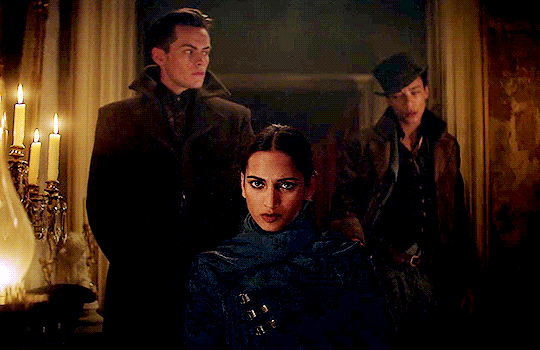
Jesper, Inej, and Kaz are all allowed to be flawed, to have serious conflicts with one another, and yet to love each other. They feel like a found family in the best of ways. Kaz is the perfect selfish rogue; he’s a much more successfully executed Byronic hero than the Darkling, actually. Inej is heroic and her faith is not mocked, yet she too is flawed and her choices are not always entirely justified, but instead left to the audience to ponder (like killing the girl), which is a more mature writing choice that I appreciated.
Jesper is charming, has a heart of gold despite being a murderer and on the surface fairly greedy, and MILO THE EMOTIONAL SUPPORT GOAT WAS THE BEST THING EVER. I also liked Jesper’s fling with Dima but I felt it could be better used rather than merely establishing his sexuality, like if Jesper and Dima had seen each other one more time or something had come of their tryst for the plot/themes/development of Jesper.
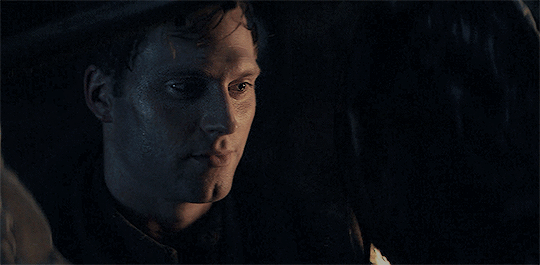
Nina and Matthias’s backstory being in the first season, instead of in flashbacks, really works because it automatically erases any discomfort of the implications of Nina having falsely accused Matthias that the books start with. We know Nina, we know Matthias, we know their motivations, backgrounds, and why they feel the way we do. It’ll be easy for the audience to root for them without a lot of unnecessary hate springing from misunderstanding Nina (since she’s my favorite). Matthias’s arc was also really strongly executed and satisfyingly tragic. Their plotline was a bit unfortunately disconnected from the rest of the story, but Danielle Gallagan and Callahan Skogman have absolutely sizzling chemistry so I found myself looking forward to their scenes instead of feeling distracted. Also? It’s nice seeing a woman with Nina’s body type as a romantic and powerful character.
Hamliet Likes Malina Now
Insofar as the trilogy storyline goes, the best change the show made was Mal. He still is the same character from the books, but much more likable. The pining was... a lot (too much in episode 4, I felt) but Malina is a ship I actually enjoyed in the show while I NOTP’d it in the books. Mal has complexity and layers to his motivations (somewhat) and a likable if awkward charm. Archie Renaux was fantastic.
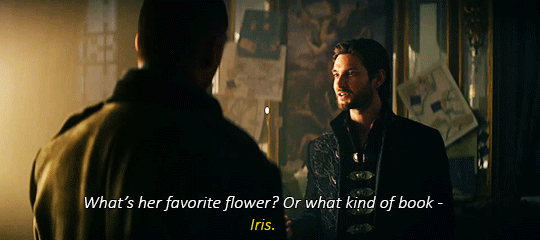
Ben Barnes is the perfect Aleksandr Kirigan, and 15 year old me, who had the biggest of big crushes on Ben Barnes (first celebrity crush over a decade ago lol), was pretty damn happy lol. He’s magnificantly acted--sympathetic and terrifying, sincerely caring and yet villainous in moments. Story-wise, I think it was smart to reveal his name earlier on than in the books, because it helps with the humanization especially in a visual medium like film. Luda was a fitting (if heartbreaking) backstory, but it is also hard for me to stomach knowing what the endgame of his character is. Like... I get the X-men fallacy thing, but I hope the show gives more kindness to his character than the books did, yet I’m afraid to hold my breath. Just saying that if you employ save the cat, if you directly say you added this part (Luda) to make the character more likable (as the director did) please do not punish the audience for feeling what you intended.
I also liked the change that made Alina half-Shu. It adds well to her arc and fits with her character, actually giving her motivations (she kinda just wants to be ordinary in a lot of ways) a much more interesting foundation than in the books. Also it’s nice not to have another knock-off Daenerys (looking to you Celaena and book!Alina). Jessie Mei Li does a good job playing Alina’s insecurities and emotions, but...
Narrative: The Ehhhhhhh
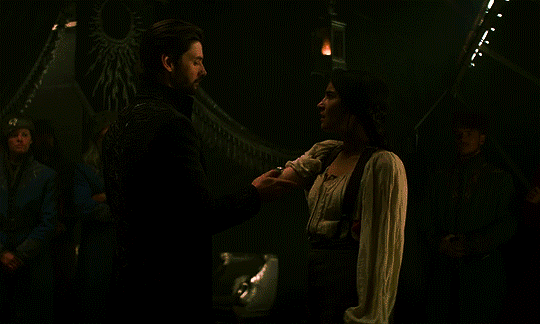
Alina the Lamp
Sigh. Here we go. Alina has little consistent characterization. She’s almost always passive when we see her, yet she apparently punches an officer for calling her a name and this seems to be normal for her, but it doesn’t fit at all with what we know about her thus far. Contradictions are a part of humanity, but it’s never given any focus, so it comes across as inconsistent instead of a flaw or repression.
I have no idea what Alina wants, beside that she wants to be with Mal, which is fine except I have no idea what the basis of their bond is. Even with like, other childhood friends to lovers like Ren/Nora in RWBY or Eren/Mikasa in SnK, there’s an inciting moment, a reason, that we learn very early on in their story to show us what draws them together. Alina and Mal just don’t have that. There’s the meadow/running away thing, but they were already so close, and why? Why, exactly? What brought them together? The term “bullies” is thrown around but it isn’t ever explored and it needed to be this season. If I have to deal with intense pining for so many episodes at least give me a foundation for their devotion. You need to put this in the beginning, in the first season. You just do.
A “lamp” character is a common metaphor to describe a bad character: essentially, you could replace the character with a lamp and nothing changes. Considering Alina’s gift is light, it’s a funnily apt metaphor, but it really does apply. Her choices just don’t... matter. She could be a special lamp everyone is fighting over and almost nothing would change. The ironic thing is that everyone treating her like a fancy lamp is exactly the conflict, but it’s never delved into. We’re never shown that Alina is more than a lamp. She never has to struggle because her choices are made for her and information is gifted to her when she needs it. Not making choices protects Alina from consequences and the story gives her little incentive to change that; in fact, things tend to turn out better when she doesn’t make choices (magic stags will arrive).
Like... let’s look at a few occasions when Alina almost or does make choices. For example, she chooses to (it seems) sleep with Kirigan, but then there’s a convenient knock at the door and Bhagra arrives with key information that changes Alina’s mind instantly despite the fact that Bhagra’s been pretty terrible to her. If you want to write a woman realizing she’s been duped by a cruel man, show her discovering it instead of having the man’s abusive mother tell her when she had absolutely no such suspicions beforehand. There’s no emotional weight there because Alina doesn’t struggle.
When she is actually allowed to carry out a bad choice, the consequences are handwaved away instead of built into a challenge for her. Like... Alina got her friends killed. More than once. I’m not saying she’s entirely to blame for these but could we show her reacting to it? Feeling any sort of grief? She never mentions Raisa or Alexei after they’re gone, just Mal, and I’m... okay. They were there because of you. Aren’t you feeling anything? Aren’t you sad? The only time Alina brings up her friends’ deaths is to tell Kirigan he killed her friends when they were only there because she burned the maps. She yells at Kirigan for “never” giving her a choice, but she almost never makes any, so why would he? Alina has the gall to lecture Genya about choices, but she herself almost never has to make any.
Which brings me to another complaint in general: Alina’s lack of care for everyone around her when they’re not Mal, even if they care for her. Marie dies because of her (absolutely not her fault of course) but as far as we know she never even learns about Marie. She certainly doesn’t ever ask about her or Nadia. Alina seems apathetic at best to people, certainly not compassionate or kind.
The frustrating thing is that there is potential here. Like, it actually makes a lot of psychological sense for an orphan who has grown up losing to be reluctant to care for people outside of her orbit and that she would struggle to believe she can have any say in her destiny (ie make choices). It’s also interesting that a girl who feels like an outsider views others outside her. But the show never offers examines Alina’s psychology with any depth; it simply tells us she’s compassionate when she is demonstrably not, it tells us she makes decisions when it takes magical intervention to do so. It’s a missed opportunity. This does not change between episodes 1 and 8, despite the episodes’ parallel structures and scenes, which unintentionally reinforces that Alina had little real development.
Inej and ironically Jesper and Kaz embody the concept of “mercy” far better and with far more complexity than Alina does. The Crows have reactions to the loss of people who even betray them (Arken, etc), learn, and course-correct (or don’t) when they are even loosely involved in having strangers die. They’re good characters because they change and learn and have their choices matter. When they kill we see them wrestle with it and what this means even if they are accustomed to doing so. Jesper can’t kill in front of a child. Kaz wonders what his killings do to Inej’s idea of him.
Narrative: The Mixed Bag
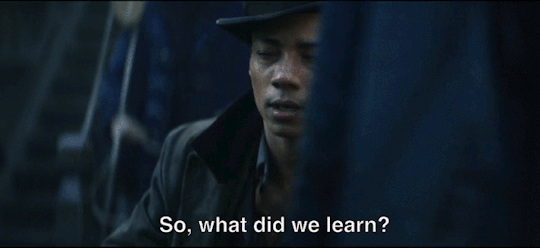
Tropes, Themes, Telling vs. Showing
So the show’s themes in the Alina storyline are a mess, as they are in the trilogy too. Tropes are a very valuable way to show your audience what you’re trying to say. They’re utilized worldwide because they resonate with people and we know what to expect from them. The Crows' storyline shows us what it wants us to learn.
Preaching tells, and unfortunately, the trilogy relies on telling/preaching against fornicationBad Boys. It’s your right to write any trope or trample any trope you want--your story--but you should at least understand what/why you are doing so. The author clearly knows enough about Jungian shadows and dark/light yin/yang symbolism to use it in the story, but then just handwaves it away as “I don’t like this” but never does so in a narratively effective way: addressing the appeal in the first place. If you really wanna deconstruct a trope, you gotta empathize with the core of the reason these tropes appeal to people (it allays deep fears that we are ourselves unlovable, through loving another person despite how beastly they can be), and address this instead of ignoring it. Show us a better way through the Fold of your story. Don’t just go around it and ignore the issue.
The trilogy offers highly simplistic themes at best--bad boy bad and good boy good, which is fine-ish for kid lit but less fine for adult complexity, which the show (more so than the books) seems to try to push despite not actually having much of it.
Alina and Mal are intended to be good, we’re told they are, but I’m not sure why beyond just that we’re told so. Alina claims the stag chose her, but in the show it’s never explained why at all. Unlike with Kaz, Inej, Jesper, and hell even Matthias and Nina, we don’t see Alina or Mal’s complex choices and internal wrestling.
Like, Inej’s half-episode where she almost killed the guy they needed was far more character exploration than Alina has the entire show, to say nothing of Inej’s later killing which not only makes her leaps and bounds more interesting, but ironically cements her as a far more compelling and yes, likable, heroine than Alina. We see Inej’s emotional and moral conflict. We can relate to her. We see Kaz struggling with his selfishness and regrets, with his understanding of himself through his interactions with and observations of Inej, Alina, the Darkling, Arken, and Jesper.
We don’t explore what makes Mal or Alina good and what makes them bad. We don’t know what Alina discovers about herself, what her power means for her. We are told they are good, we are told she knows her power is hers, but never shown what this means or what this costs them/her. Their opportunities to be good are handed to them (the stag, Bhagra) instead of given to them as a challenge in which they risk things, in which doing good or making a merciful choice costs them. Alina gets to preach about choices without ever making any; Inej risks going back to the Menagerie to trust Kaz. Her choices risk. They cost. They matter and direct her storyline and her arc, and those of the people around her.
Production Stuff:
The Good:
The production overall is quite excellent. The costumes, pacing, acting, and cinematography (for example, one of the earliest scenes between the Darkling and Alina has Alina with her back to the light, face covered in his shadow, while the Darkling’s face is light up by her light even if he stands in the shadows) are top-notch. The soundtrack as well is incredible and emphasizes the scenes playing. The actors have great chemistry together, friend chemistry and romantic when necessary (Mal and Alina, the Darkling and Alina, Kaz and Inej, Nina and Matthias, David and Genya, etc.) All are perfectly cast.
The Uncomfortable Technicalities Hamliet Wants to Bitch About:
The only characters from fantasy!Europe having any trace of an accent reminiscent of said fantasy country's real-world equivalent are antagonists like Druskelle (Scandinavia) and Pekka (Ireland). When the heroes mostly have British accents despite being from fantasy Russia and Holland, it is certainly A Choice to have the Irish accent emphasized. The actor is British by the way, so I presume he purposely put on an Irish accent. I'm sure no one even considered the potential implications of this but it is A Look nonetheless.
The Anachronisms Hamliet Has a Pet Peeve About:
The worldbuilding is compelling, but the only blight on the worldbuilding within the story itself (ignoring context) was that there are some anachronisms that took me out of the story, particularly in the first episode where “would you like to share with the class” and “saved by the horn” are both used. Both are modern-day idioms in English that just don’t fit, especially the latter. The last episode uses “the friends we made along the way.” There are other modern idioms as well.
IT’S STARKOVA and Other Pet Peeves Around the Russian Portrayal
Russian names are not hard, and Russian naming systems are very, very easy to learn. I could have waved “Starkov” not being “Starkova,” “Nazyalensky” not being “Nazyalenskaya,” and “Safin” not being “Safina” as an American interpretation (since in America, the names do not femininize). However, “Mozorova” as a man is unfathomable and suggests to me the author just doesn’t understand how names work, which is a bit... uh okay considering a simple google search gets you to understand Russian names. They aren’t hard. I cannot understand why the show did not fix this. It is so simple to fix and would be a major way to help the story’s overall... caricature of Russia.
Speaking of that... Ravka is supposedly Russian-based, but it is more accurately based on the stereotypes of what Americans think of Russia. Amerussia? Russica? Not great.
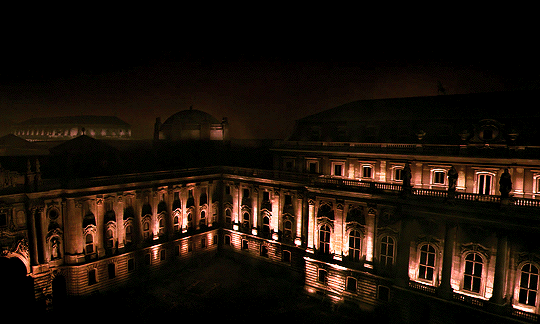
The royals are exactly what Americans think of the Romanovs, right down to the “greasy” “spiritual advisor” who is clearly Rasputin and which ignores the Romanov history, very real tragedy, and the reason Rasputin was present in the court. The religion with all its saints is a vapid reflection of Russian Orthodoxy. The military portrayal with its lotteries and brutality and war is how the US views the Russian military. The emphasis on orphans, constant starvation, classification, and children being ripped from their homes to serve the government is a classic US understanding of USSR communism right down to the USSR having weapons of destruction the rest of the world fears (Grisha). Not trying to defend the Soviet Union here at all, but it is simplistic and reductive and probably done unconsciously but still ehhhh.
However, I’m not Russian. I just studied Russian literature. I’ve seen very little by way of discussion of this topic online, but what I do see from Russian people has been mixed--some mind, some don’t. The reality is that I actually don’t really mind this because it’s fantasy, though I see why some do. I'm not like CANCEL THIS. So why am I talking about this beyond just having a pet peeve?
Well, because it is a valid critique, and because it doesn’t occur in a vacuum. The Grishaverse is heralded as an almost paragon for woke Young Adult literature, which underlines itself what so frustrates me about how literary circles discuss issues of diversity and culture. Such praise, while ignoring its quasi-caricature of Russia, reflects a very ethnocentric (specifically American) understanding of culture, appropriation, and representation. All stories are products of their culture to various extents, but it bothers me on principle what the lit community reacts (and overreacts sometimes?) to and what people give a pass to. The answer to what the community reacts to and what it gives a pass always pivots on how palatable the appropriation is to American understandings and sensibilities. There’s nuance here as well, though.
I'm not cancelling the story or thinking it should be harshly attacked for this, but it is something that can be discussed and imo should be far more often--but with the nuance it begs, instead of black/white. But that’s a tall ask.
#s&b#hamliet reviews#shadow and bone#six of crows#kanej#jesper fahey#kaz brekker#inej ghafa#alina starkov#malyen oretsev#the darkling#darklina#malina#aleksander kirigan#netflix shadow and bone#s&b review
276 notes
·
View notes
Note
Do you think Jason Todd fandom is kinda toxic? Because it seems like NO MATTER what DC do, there'll always be complains. Forget the bad adaptation like Titans. Even Judd Winick cannot escape the criticism with how he potrayed Robin!Jason. They just never satisfied.
SORRY, IT TOOK ME SO LONG TO RESPOND TO THIS. I just moved from Washington D.C. to Seattle, which, for my non-American friends, that's 4442km away. And I DROVE THERE ALL BY MYSELF. And now I'm trying to find new work in a new city and trying to stay mentally healthy and positive. Life is exciting but hard and scary.
*sighs*
As someone who was a fandom elder with V*ltr*n. I've seen some of the worst when it comes to fandom behavior. I'm talking people baking food with shaving razors and trying to give them to the showrunners. I'm talking leaking major plot details and refusing to take it down unless they make their ship canon (I am looking at you, Kl*nce stans) For the most part, DC Comics has had a decades-long reputation of treating their fans like trash and not caring what they think so from what I've seen, we all just grumble and complain in our corners of the internet about how we don't like how X comic portrays Jason Todd.
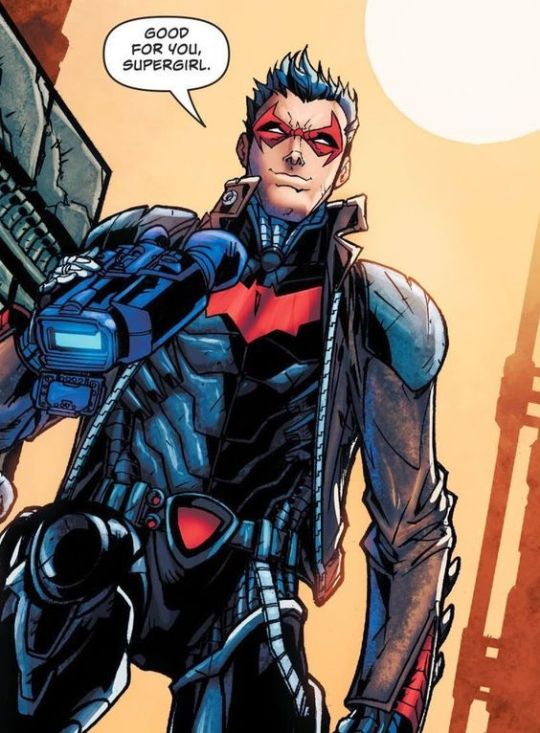
The challenge with Jason Todd is that he's your clinical anti-hero, the batfamily's Draco in Leather Pants, he's a jerkass woobie, and on top of all of that, he's a Tumblr sexyman. It's a perfect storm for a very fun but frustrating character to be a fan of. It doesn't help that every writer decides to re-invent the wheel every time Jason comes up so his canon lore is confusing at best and inconsistent as a standard.
I guess starting with a general brief on who Jason is and what is uniform about him with every instance he's appeared in comics/media.
Grew up in a poor family in Gotham with a dad who was a petty-mid-level criminal, and a mother who dies of a drug overdose.
Survives on the street on his own by committing petty crimes and potentially even engaging in sexual acts to keep himself alive.
Is cornered by Batman and taken in after Dick Grayson quits/is fired
Becomes the second Robin, but is known for being the harsher, more brutal Robin.
Is killed by Joker after being tortured, but somehow comes back to life and regains senses through the Lazarus Pit
Resolves himself to be better than Batman by basically being Batman but kills people.
Where there has been a lot of conflict in the fandom is the fact that Jason Todd is not a character that is written consistently. DC Comics loves to go with the narrative that Jason was "bad from the start" and was the "bad robin" when, yes, he has trouble controlling his anger, but he also still is just as invested in seeing the best of Gotham City and trying to be a positive change for the world as any other DC Comics hero.
Where I get frustrated with the fandom is its ability to knit-pick every detail of a comic they don't like while completely disregarding everything that makes the comics great and worth it to read. My example being Urban Legends. To which most people had pretty mixed reactions to. I was critical of the comic at first but as it went along I ended up really liking it. I have a feeling DC Comics went to Chip Zdarsky and told him he had 6 issues to bring Jason back into the Bat Family, and honestly he didn't do a bad job. Did it feel rushed? Absolutely. I wish there was more development of Jason and Bruce's characters and their dynamic as a whole. However, where I see a lot of people being angry and upset with Urban Legends is that they feel Zdarsky needlessly wrote Jason as an incompetent fool who needs Bruce to save him.
Whether or not that was the intention of Zdarsky is up to debate. However, and this may be controversial, but I don't think he wrote Jason Todd out of character at all. For as fearsome, intimidating, and awesome as Red Hood is. Jason is a character who is absolutely driven by his emotions. Why do you think he donned the role of Red Hood? As a response to his anger towards The Joker for killing him, and towards Bruce for not taking action against The Joker and for seemingly replacing him so quickly after he died. Jason didn't care about being the murderous Robin Hood or for being the bloody hammer of justice against N*zi's and P*d*ph*les. He only cared originally about making The Joker and Bruce pay. It wasn't until he trained under the best assassins in the world and realized most of them were horrific criminals who trafficked children and were p*dos that Talia began to realize that the teachers that she sent Jason to train under started dying horrific and painful deaths.
The entire story of the Cheer story in Batman Urban Legends was started because it finally forced some consequences upon Jason. Tyler, aka Blue Hood's father was a drug dealer who gave his supply to his wife and kids. And when Tyler's father admitted he gave the drugs to Tyler, it immediately made him fall within the self-imposed philosophical kill-list of Jason Todd. And Jason, well, he proceeds to kill Tyler's father. When this happens, Jason is in shock. Tyler's dad fit the bill to easily and justifiably be killed by Jason. We've never seen Jason having to deal with the consequences of being a murderous vigilante on a micro-level. When Jason realizes what he's done in that he's murdered Tyler's dad, he's shocked. He tells Babs the truth. He does a rational thing because he's in shock. He doesn't know what to do, he never has had to face the consequences of his actions as Red Hood and now the gravity of befriending a child as a vigilante hero who kills people just set in when he killed the father of the same child he was just introduced to.
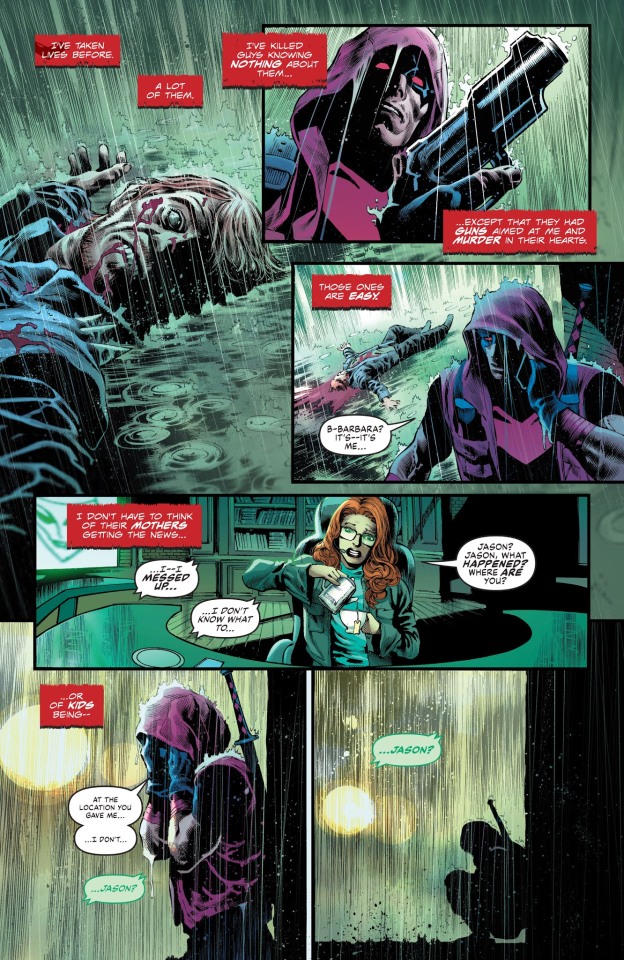
(Oh here's a little aside because it had to be said, Jason would not have been a good father or a good mentor to Tyler and absolutely should not have been his new Robin. Jason is a man who is in his early 20's (not saying men in their early 20's can't be good fathers at all) who is a brutal serial killer using the guise of a vigilante anti-hero to let him escape most of the law. the complications of having the man who murdered your father adopt you and make you his sidekick are way too numerous for me to explain in a long-winded already heavy Tumblr essay post. There's a reason why we don't advocate for a story where Joe Chill adopted Bruce Wayne or one where Tony Zucco took in Dick Grayson.)
The next biggest argument is that they feel that Jason is giving up his guns as a means to just be invited back into the Bat-Family. To which I will tell anyone who has that argument to go actually read Urban Legends. Already have and still have that argument? Please re-read it. Don't want to? That's okay, I will paste the images from the comic where Jason specifically says that he doesn't want to give up his weapons for Bruce and his real reasoning down below since the comic isn't exactly readily accessible.
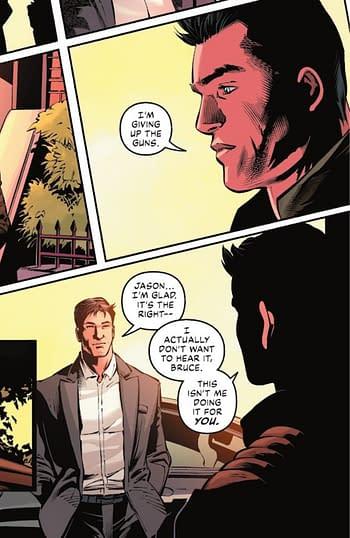
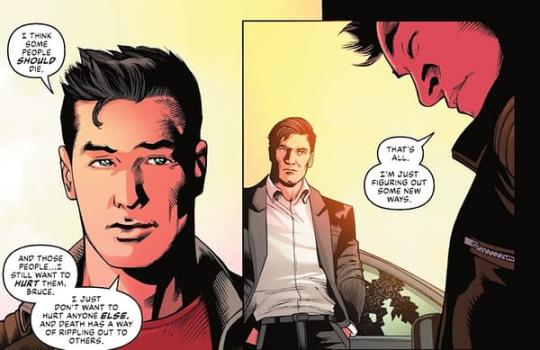
Jason gave up the guns because he felt the gravity of what he had done and knows how it'll effect Tyler. Thankfully his mom is alive and in recovery. But Tyler doesn't have a father anymore. And Jason killed Tyler's father. It may have been in accordance to Jason's philosophy, but it was a case where it blurred the lines. Jason Todd isn't a black and white character, just very dark gray. He doesn't kill aimlessly like the Joker. If you are on Jason's list you probably have done something pretty horrific, and also just in general, being in his way or being a threat to him. Mind you, in early days of Red Hood and the Outlaws (Image below) Jason almost killed 10 innocent civilians in a town in Colorado all because they saw him kill a monster. That being said, Jason isn't aimless in his kills.
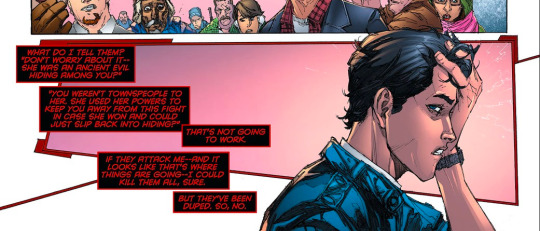
(Also can we just take a moment to appreciate Kenneth Rocafort's art? DC Comics said we need to rehabilitate Jason Todd's image and Kenneth Rocafort said hold my beer: It's so SO GOOD)
That being said, the key emphasis in the story of Cheer asides from trying to introduce Jason Todd back into the Bat Family and give an actual purpose for him being there, other than him just kind of being there ala Bowser every time he shows up for Go Kart racing, Tennis, Golf, Soccer, and the Olympic games when Mario invites him, is that Jason and Bruce ultimately both want the same thing. Jason wants to be welcomed back into the family and to be loved and appreciated. Bruce want's Jason back as his son and wants to love and protect Jason. Both of these visions are shown in the last chapter of Cheer while under the effect of the Cheer Gas. It's ultimately this love and appreciation they both have for each other that helps them overcome their challenge and win.
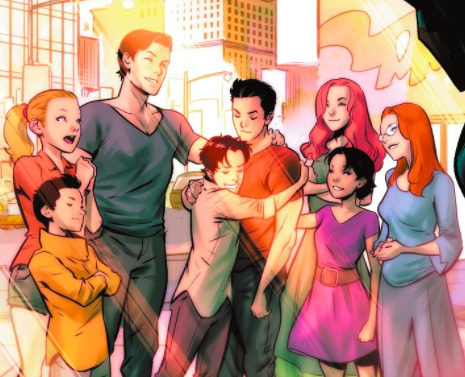

Jason Todd is a character who, just like Bruce, has been through so much pain and so much hate in his life. The two are meant to parallel each other. While Bruce chose to see the best in everyone, giving every rogue in his gallery the option to be helped and give them a second chance, hence why he never kills, Jason has a similar view on wanting to protect the public, but he understands that some crimes are so heinous they cannot be forgiven, or that some habitual criminals are due to stay habitual criminals, and need to be put down. But at the end of the day, the two of them both try to protect people in their own ways.
I am aware that through the writings of various DC Comics authors such as Scott Lobdell and Judd Winick, the two have had a very tumultuous relationship. And rightfully so, I am by no means saying that Scott Lobdell writing an arc where Bruce literally beats Jason to within an inch of his life in Red Hood and the Outlaws, nor Judd Winick's interpretation of Under the Red Hood where Bruce throws the Batarang at Jason's neck, slicing his throat and leaving him ambiguously for dead at the end of the comic is appropriate considering DC Comics seems to be trying everything they can to integrate Jason back into the family. That being said, a lot of these writings have shaped the narrative of Jason and Bruce's relationship and have an integral effect on the way the fandom views the two. It doesn't help that Zdarsky acknowledged Lobdell's life-beating of Jason by Bruce at the very end of Cheer by having Bruce give Jason his old outfit back as a means of mending the fence between the two of them. That does complicate a lot of things in terms of how they are viewed by the fandom and helps to cause an even greater divide between the two.
Regardless, I want to emphasize the fact that Jason Todd is a part of the family of his own accord. Yes, he's quite snarky and deadpan in almost every encounter. However, Jason is absolutely a part of the family and has been for a while of his own will. There's a great moment in Detective Comics that emphasizes this. Jason cares about his family because it is his found family. Yes, they may be warry about him and use him as a punching back and/or heckle him. At the end of the day, we're debating the family dynamics of a fictional playboy billionaire vigilante whose kleptomania took the form of adopting troubled children and turning them into vigilante heroes. Jason Todd wants a family that will love and support him. This is a key definition of his character at its most basic. This was proven during the events of Cheer and is being reenforced by DC Comics every time they get the opportunity to do so.

Now, none of this is to say that I hate Judd Winick. I do not, I don't like the fact that in all of his writings of Jason, he just writes him as a dangerous psychopath, and Winick himself admits to seeing Jason as nothing much more than a psychopath. Yet Winick is the one who the majority of the fandom clings to as the one true good writer of Jason Todd because 'Jason was competent, dangerous, smart' Listen, friends, Jason is all of that and I will never deny it. However, what I love about Jason isn't that he's dangerously smart of that writers either write him as angsty angry Tumblr sexyman bait or that they write him as an infantile man child with a gun. There's a large contention of this fandom that has an obsession with Jason Todd being this vigilante gunman who is hot and sexy and while I definitely get the appeal. It is very creepy and downright disturbing that all of you hyperfixate on his use of guns and ability to be a murderer. It is creepy and I'm not necessarily here for it.
What I love about Jason Todd is that despite all of the pain, all of the heartache, all of the betrayal, and bullying, and death, and anguish. Jason Todd is one of the most loving and supportive characters in all of DC Comics. Jason has been through so much in his life, but he still chooses to love. He still chooses to see the bright side in people. Yes, he takes a utilitarian approach and chooses to kill certain villains, but at the end of the day he wants to see a better world, and he wants to be loved. It takes so much courage and so much heart to learn to love again after one has been abused or traumatized. I would not blame Jason at all if he said fuck it and just went full solo and vigilante evil. He has every right to, but he still chooses to be with the Bat Family of his own accord. That's something that I see a lot of in myself. I have been through a lot of trauma and yet I try to be a better person myself in any way that I can. It is extremely admirable of Jason to allow love back into his heart when he really doesn't need to. He kills and he protects because he has this love of society. It may have been shaped by anger and hatred, but Jason has found his place amongst people who love him and value him. I think Ducra, from Red Hood and the Outlaws put it best in the image given below.

To end this tangent, I love Jason Todd and all of his sexy dangerousness, but it's far more than that. As much as Jason may be dangerous and snarky, he loves his family without a shadow of a doubt. I look up to Jason Todd because despite all of his pain and all of his trauma, he still choses to love. Jason Todd is a character who is someone I love because despite all of his flaws and having a very toxic fandom, he still serves as a character filled with so much heart and so much passion. I wish more writers would understand that. But for now I will live with what I have. Even though the fandom may be vocal about it's hatred for his characterization, I choose to love Jason regardless because he is a character who chooses love and acceptance regardless of his pain. Jason Todd is by no means a good person in any sense of the word. He has easily killed upwards of 100 people by now. He is a character who is flawed and complex but ultimately is one who powers forwards and finds love and heart in a place from so much pain and anguish. That is what I love about Jason Todd. After all, to quote a famous undead robot superhero, "What is grief, if not love persevering?" Jason Todd chooses to love despite all of the trauma and pain and grief. Yes, he is hardened in his exterior, but inside there is a man with a lot of love to give and someone who deserves the world in my eyes.
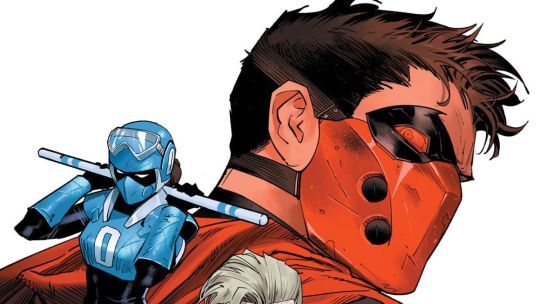
#Long post GOD#Jason Todd#Red Hood#Bat Family#Batman#red hood and the outlaws#RHATO#RH:O#Batman Urban Legends#Red Hood Lost Days#TW Voltron#TW Death#tw murder#TW Klance#Gotta love how i am pouring my heart out onto jason AND calling out the Voltron fandom#Regardless love Jason Todd people
140 notes
·
View notes